Chris Froome rides the Stage 13 time trial in the Ardèche. In a race where he’d taken seconds on descents and in the crosswinds, it was the time trials were he put minutes into his rivals and Stage 13 put him out of reach of all his rivals. This was the moment the race was won.
Marginal gains: In years past Chris Froome delivered a knock-out blow at Ax or La Pierre St. Martin whereas this time the story was more one of the steady accretion of seconds here and there. Froome’s biggest punch was landed on Stage 13, the 37.5km time trial in the Ardèche. It was a sombre day coming the morning after the terror attack in Nice, a day when the minute of silence mattered more than the minutes on the results sheet. The race went ahead and Tom Dumoulin won the day while Chris Froome put minutes into rivals. By contrast in all mountain stages whether uphill “summit” finishes or downhill dashes he only took a handful of seconds and sometimes lost time to his rivals.
Mirror, mirror up the wall: Stage 2 and the finish on the Côte de la Glacerie (Mirror Factory Hill) above Cherbourg was very instructive with hindsight. 27 riders finished in the same time as Peter Sagan and all final top-10 overall in Paris would make this front group with the exception of two riders. In other words this short hill was selective enough to give us a glimpse of who had it and who didn’t for the coming weeks. Vincenzo Nibali, Ilnur Zakarin, Thibaut Pinot and Alberto Contador were all on the wrong side of the split.
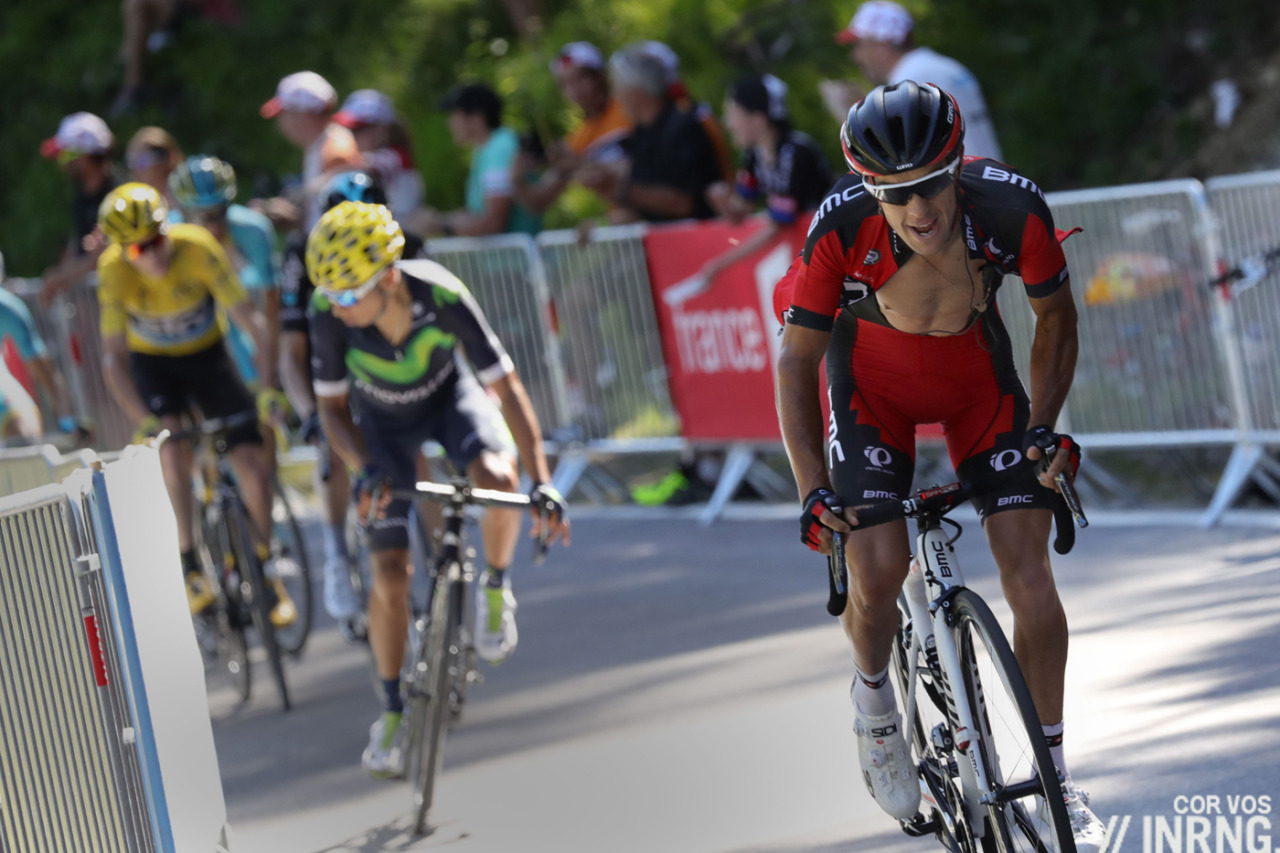
The first exception was Richie Porte after he punctured in the run-in and was accidentally ignored by his team, someone should have been with him but easier said than done on the dicey high speed approach. The noise of the crowd and the helicopters meant cries over team radio could not be heard but the split resources between him and Tejay van Garderen must also be to blame. A slow wheel change and a forlorn chase cost him 1m45s. This deficit cost Porte the podium but the Tour is more than an arithmetical contest and perhaps the loss and the opportunity to fight back unloaded the pressure that had previously burdened Porte? Porte often looked incisive in the mountains yet still went backwards, he lost time to his rivals thanks to boomerang attacks in the Alps and also paid a big price in the Ardèche time trial too.
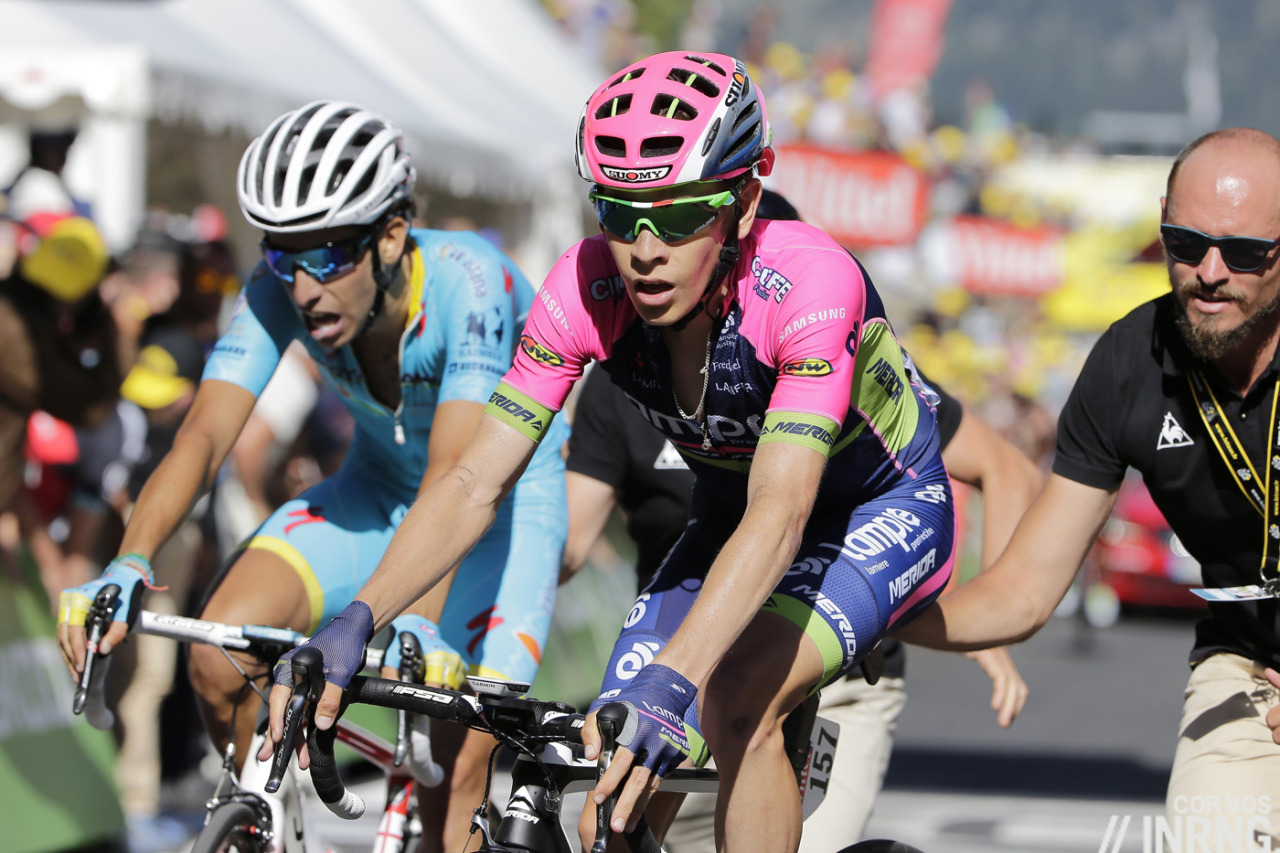
The second exception was Louis Meintjes, 8th overall and just 0.41 a second behind Joaquim Rodriguez separated by the milliseconds counted during the two time trial stages. Cherbourg was only the start, he’d lose time on several flat stages after being caught on the wrong side of splits and the good news for him is that this can be corrected with race craft and more help from his team, Lampre-Merida rarely seemed to be surrounding him with help.
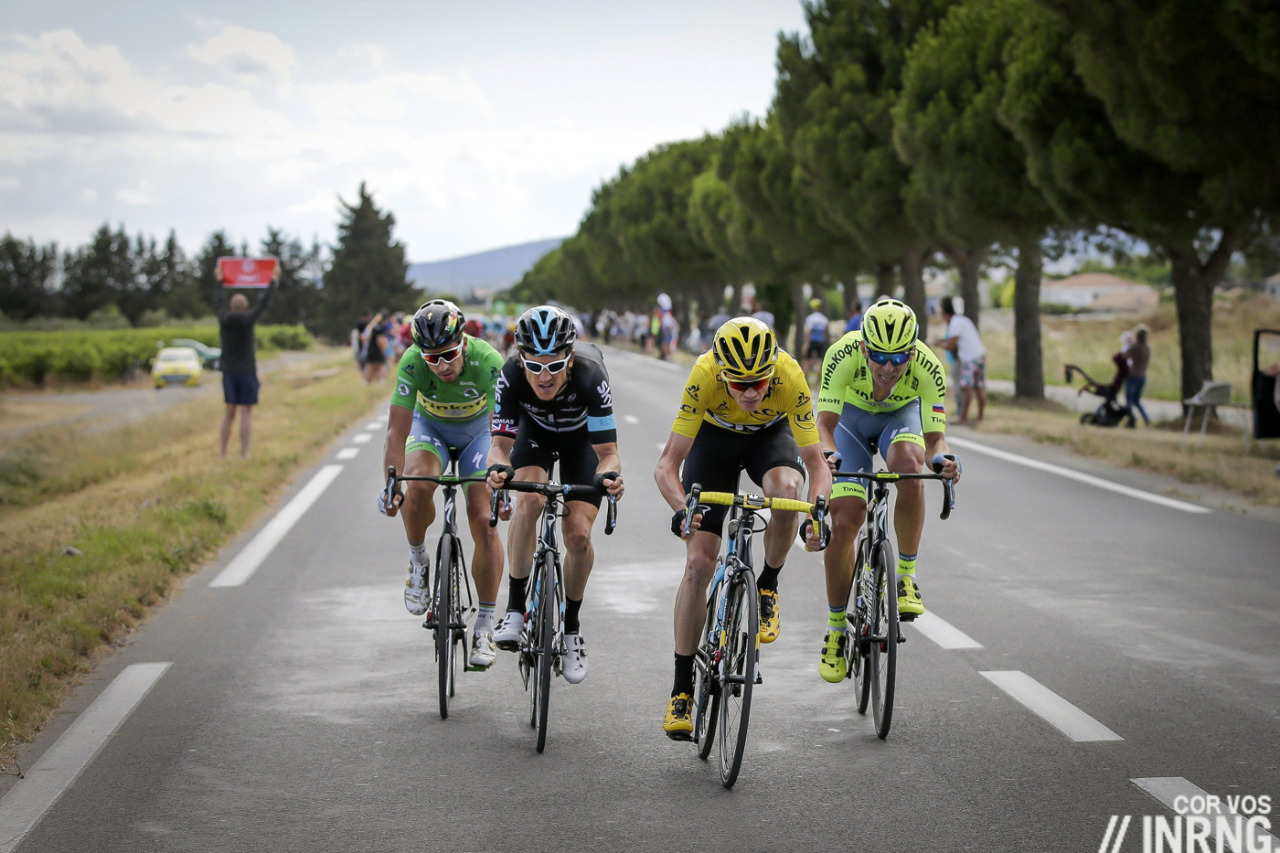
Where the race was won: Froome’s descent of the Peyresourde put him in the yellow jersey after Stage 8, a psychological win as opposed to the habitual first stage sucker-punch to his rivals and a victory for surprise rather than his W/kg ratio. Similarly Froome’s move on Stage 11 to Montpellier where he joined Peter Sagan was another psychological triumph, only a 12 second gain time bonus included but it showed him as active and in control were others, especially Nairo Quintana were on the receiving end of the Mistral wind.
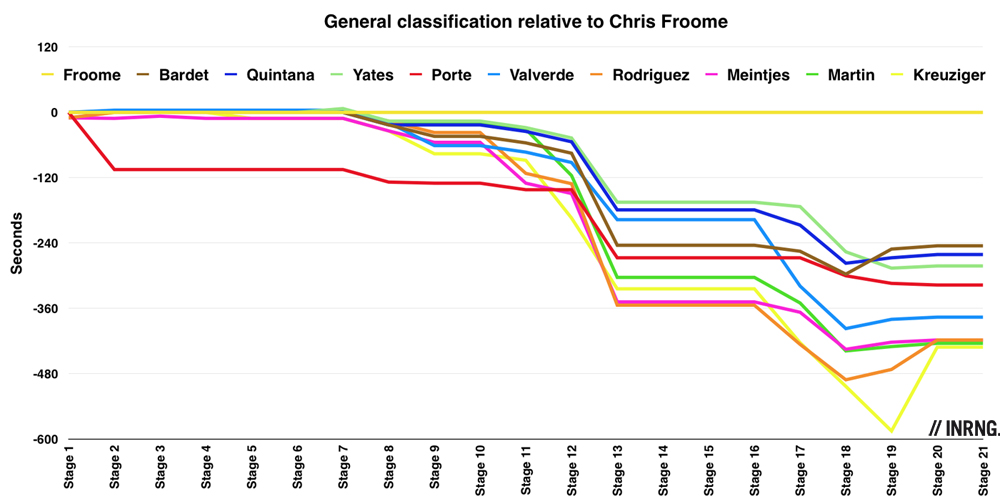
The chart shows the GC standings in time relative to Froome over the three weeks. Richie Porte’s red line takes a dip after surrendering 105 seconds with his Cherbourg puncture and all riders lost time to him on Stage 8 after his Peyresourde descent. The big inflection comes on the Stage 13 when all of Froome’s rivals fell away in the time trial. It shows the paradox where we never got a contest for the yellow jersey yet the final top-10 is the closest ever with seven minutes between it, last year it was a more typical 17 minutes, it leaves a a feeling that Froome was never attacked yet the settled view that he could not be beaten.
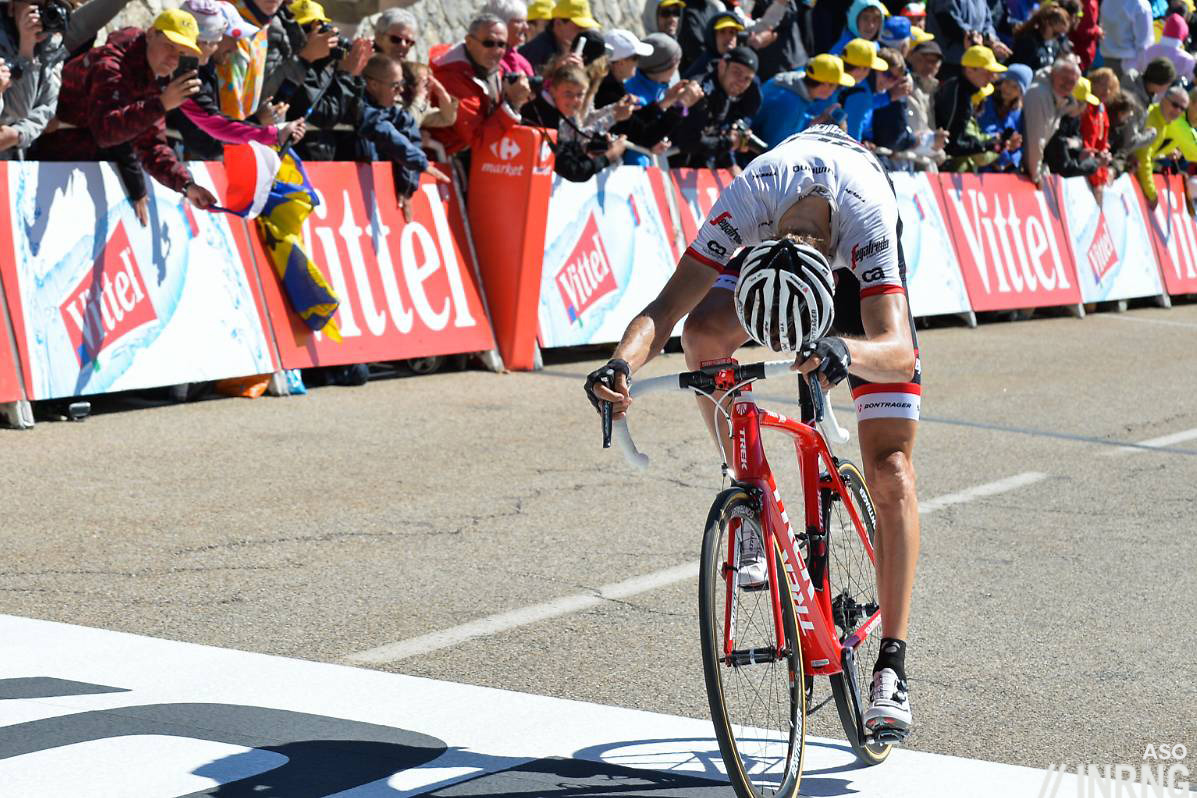
Others were in the top-10 along the way before they faded, Bauke Mollema was riding high and a hope for the podium in Paris but began to slow in the Alps, he was dropped on the climb to the Emosson dam and lost time the next day in the Domancy time trial and then a crash the final day wrecked everything.
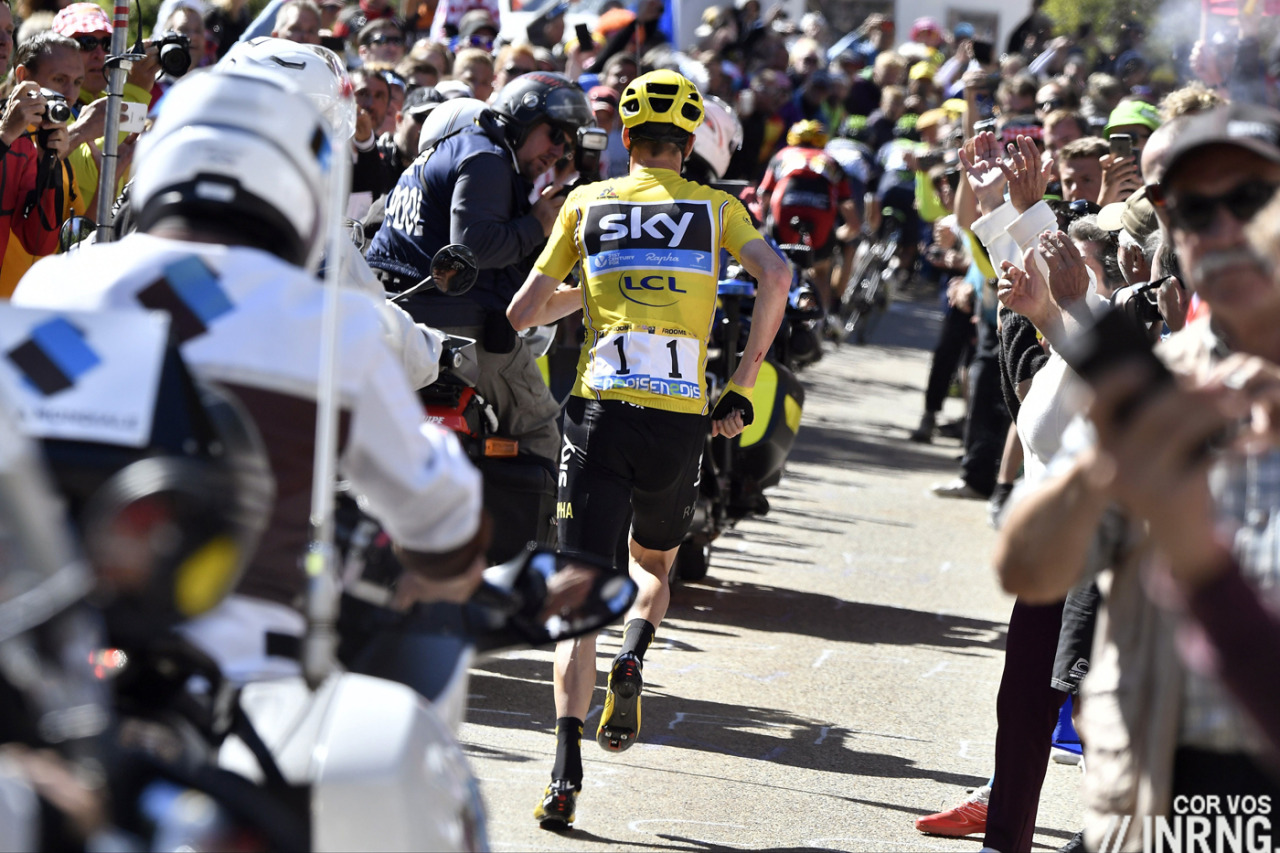
The Running Man: If there was one image of the Tour de France it’d be Froome running up Mont Ventoux. It was shocking because the TV footage arrived before knew what had happened, had he crashed, had a fan stolen his bike? It will be remembered for years but it just that, an image. In sporting terms it was inconsequential, both because the commissaires revised the day’s results and because even if Froome had lost time that day he’d have regained the yellow jersey in the following day’s time trial. To borrow from Zhou Enlai it could be soon to tell what the incident really meant, whether in terms of jurisprudence and precedent or for structural matters like the way the crowds are managed.
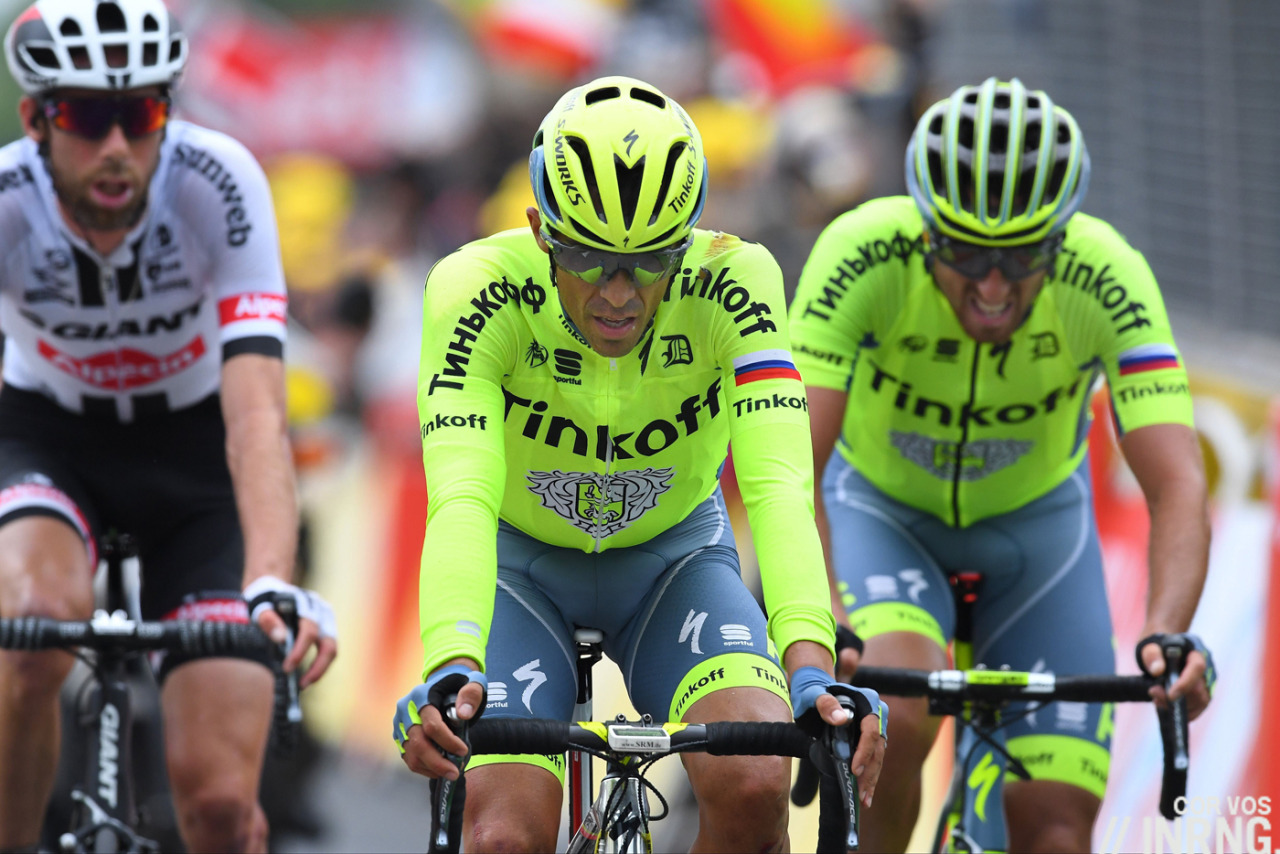
DNF and MIA: if Mollema was valiant others were simply not able to have a go. This year’s Tour had more flips and flops than a Brazilian beach and so many contenders fell by the wayside. Literally with Alberto Contador after his crash on the opening stage. He left the race and took his aggressive racing with him and would have been catalyst for the action that many were to miss in the mountain stages. Thibaut Pinot’s form was questionable before the start and we gradually got the answers, his exit marked a miss in a season where until the Dauphiné he’d hit the bullseye in almost every race he’d started. If Pinot has had a bad summer, Fabio Aru has had a dire year so far and his Dauphiné stage win was a mirage that distracted from his consistent absence in the mountains and come the Tour we only saw a spark of what he could do in the uphill time trial from Sallanches to Megève before his tragic implosion on the Joux Plane, a punishment tour of Spain awaits. Warren Barguil couldn’t improve on last year’s result, how much was down to the team’s collective crash in January is hard to know. Pierre Rolland was overhyped by a team in need of attention. Last year Tejay van Garderen said he wanted to join the Big Four contenders only to flounder after the second rest day, something he repeated again and a career review beckons. Even the omnipotent Team Sky had issues, they usually bring two GC contenders but Geraint Thomas was off the pace in the Tour de Switzerland and his results this year were worse than 2015.
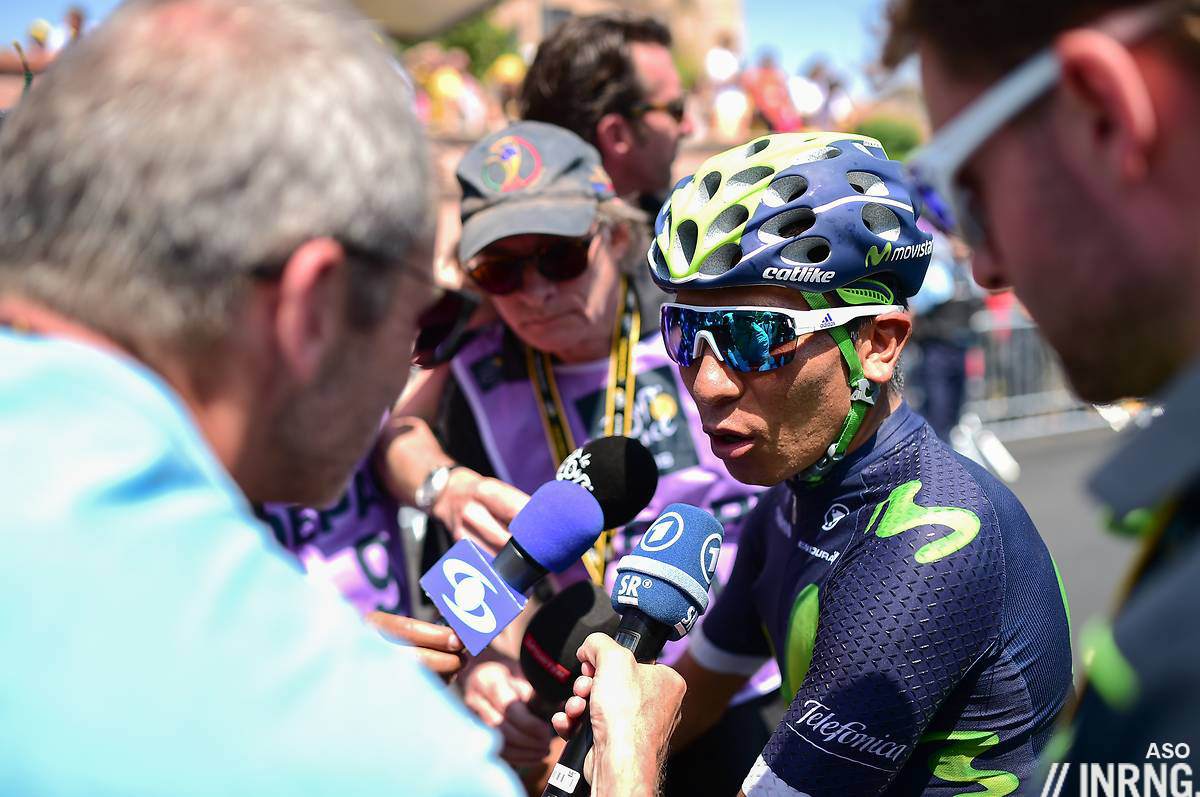
Nairo Quintana was the biggest flop. Was he overrated? No, he’s been second twice in the Tour before. Was his approach wrong, staying in Colombia for months prior only to do the modest Route du Sud? Maybe but he did exactly that last year and finished second after giving Chris Froome a fright on the final two mountain stages so he was expected to return and repeat only with some more experience. He’d banked better early-season results this year too. We still don’t know what went wrong yet for all the disappointment he finishes third. If his attacks fell flat he never cracked.
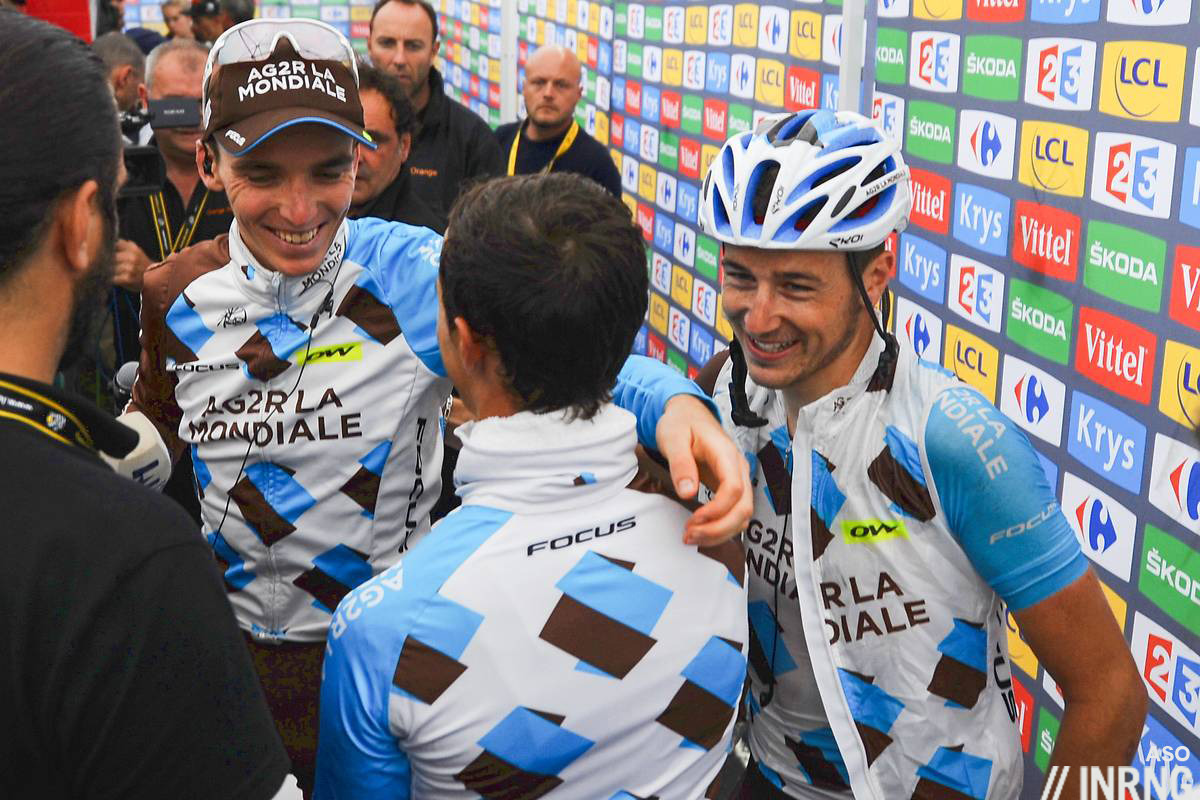
Ça va barder!: Romain Bardet finishes second thanks to consistently good climbing and his bold move down the the Domancy road and up to Le Bettex. TV footage from the Ag2r La Mondiale team car shows manager Julien Jurdie issuing a message over the radio to his riders as they approach the descent: “be careful on the Domancy section, let’s make this safe, let’s make this safe“. Only at just the same point Bardet and Mikaël Cherel were attacking the descent and riding away. The move earned Bardet 23 seconds plus the 10 second time bonus, a small gain measured by time but a giant move when set against so many others who sat tight. This was enough to leapfrog other podium rivals and to become the French darling of the race and win support from many others. His audacity was also lucky because Chris Froome crashed behind and this slowed the chase behind but that’s racing and by putting himself ahead on such a risky section of the race Bardet bought an option on the stage win and then climbed up to secure it.
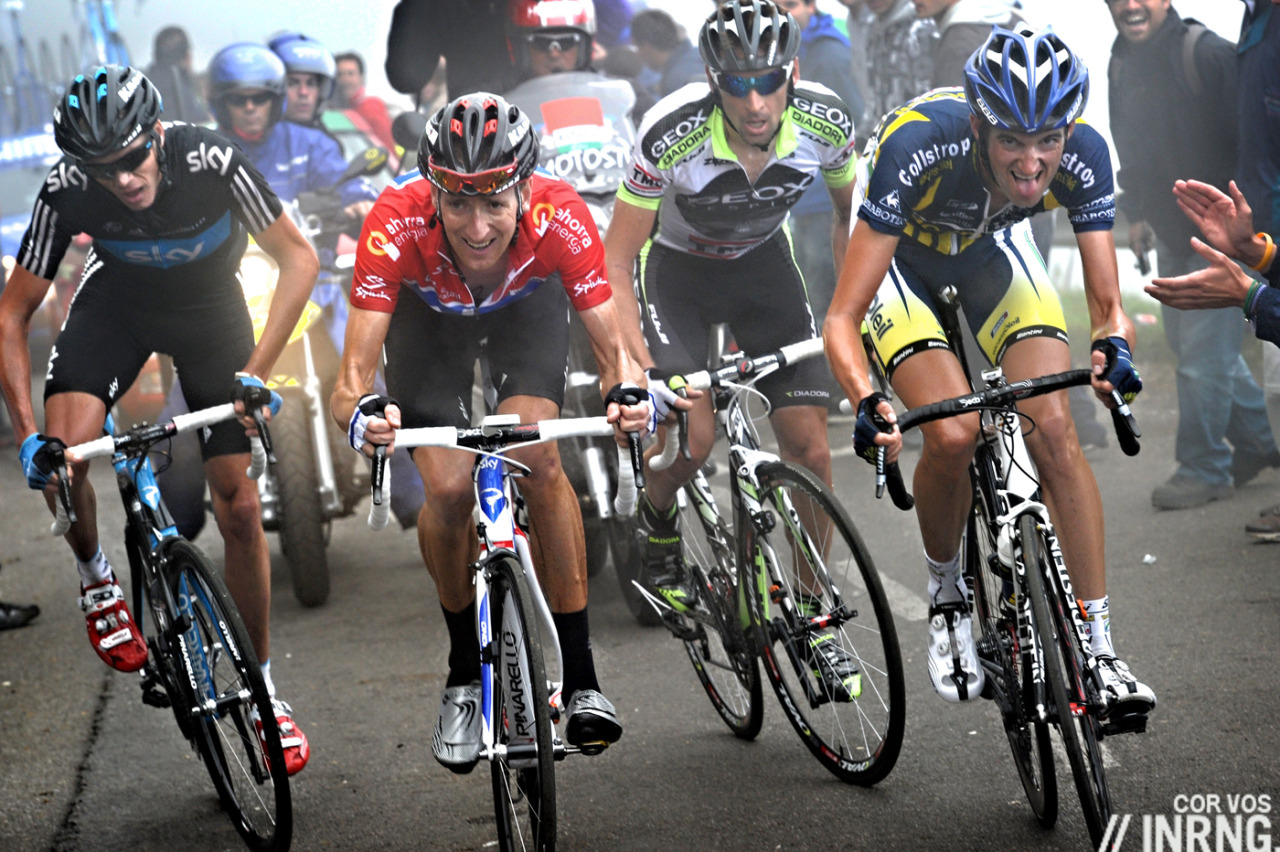
Could these contenders have challenged Team Sky? We’ll never know but in their absence we found the other rivals unable to escape the asphyxiating grip of Froome’s team especially Wout Poels, briefly a rival of Team Sky during the 2011 Vuelta a España and recruited last year. Others wanted to attack but could not overtake Team Sky’s train of millionaires.
This all lead to cries of “boring” and “Quintana must attack” as if the Colombian just wanted the quiet life or was a bicycling version of a stubborn mule that refused to budge, more Eeyore than El Condor de Tunja. He tried and couldn’t. In fact for all the promise of the high mountains it’s astonishing there was not a single meaningful uphill attack. Nobody, Froome included, launched a successful move on any of the big climbs. Yes there were attacks aplenty but nobody soared. Instead all the big GC contenders arrived in groups. Some of the action came from the wrong sources, the Ventoux crash and Froome’s slide on Stage 19 probably got hearts pumping on sofas and team cars alike.
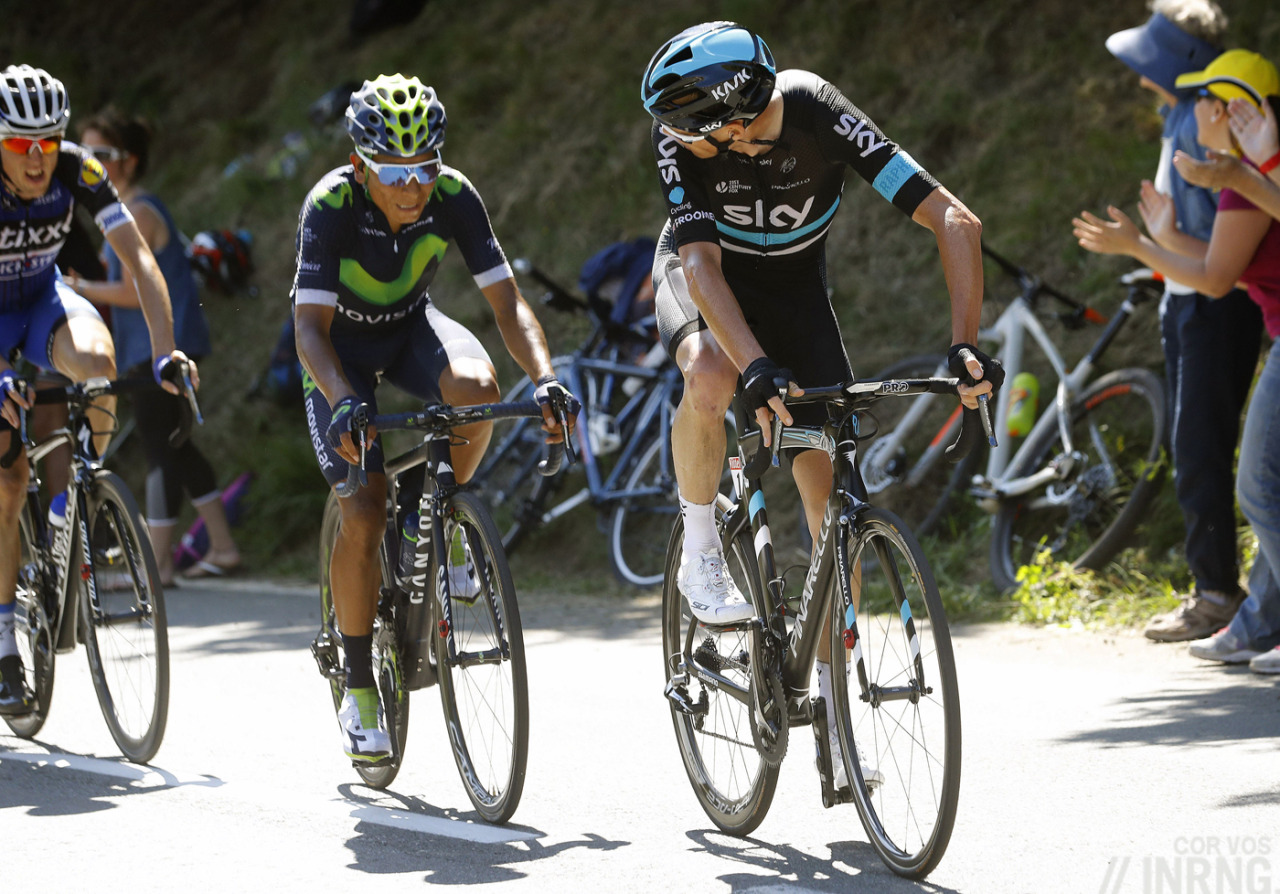
For all the complaints about this year’s race recent vintages have not been thrillers either. Last year after the La Pierre St. Martin summit finish on Stage 10 the media were reduced to the “anything can happen” phrase, code for the race is locked down barring accident. In 2014 Vincenzo Nibali took yellow on Stage 2 and once Contador and Froome crashed he begun a victory lap of France. 2013 saw Froome and Sky lock down the race; 2012 was the same only with Wiggins.
Whether it’s the immediate frustration today or longer term concerns some are calling for “something to be done” to counter Sky’s dominance. Even race director Christian Prudhomme wants smaller teams, although he’s been calling for this before Sky became a GC threat. By regulatory hazard Team Sky’s latest annual accounts were published during the Tour de France and a post on here highlighted their financial superiority. It’s hard to find a single solution and even if we raise one, say a a salary cap, it’s not a question of yes or no but more about the how, why and who. The topic is worth a separate post someday soon.
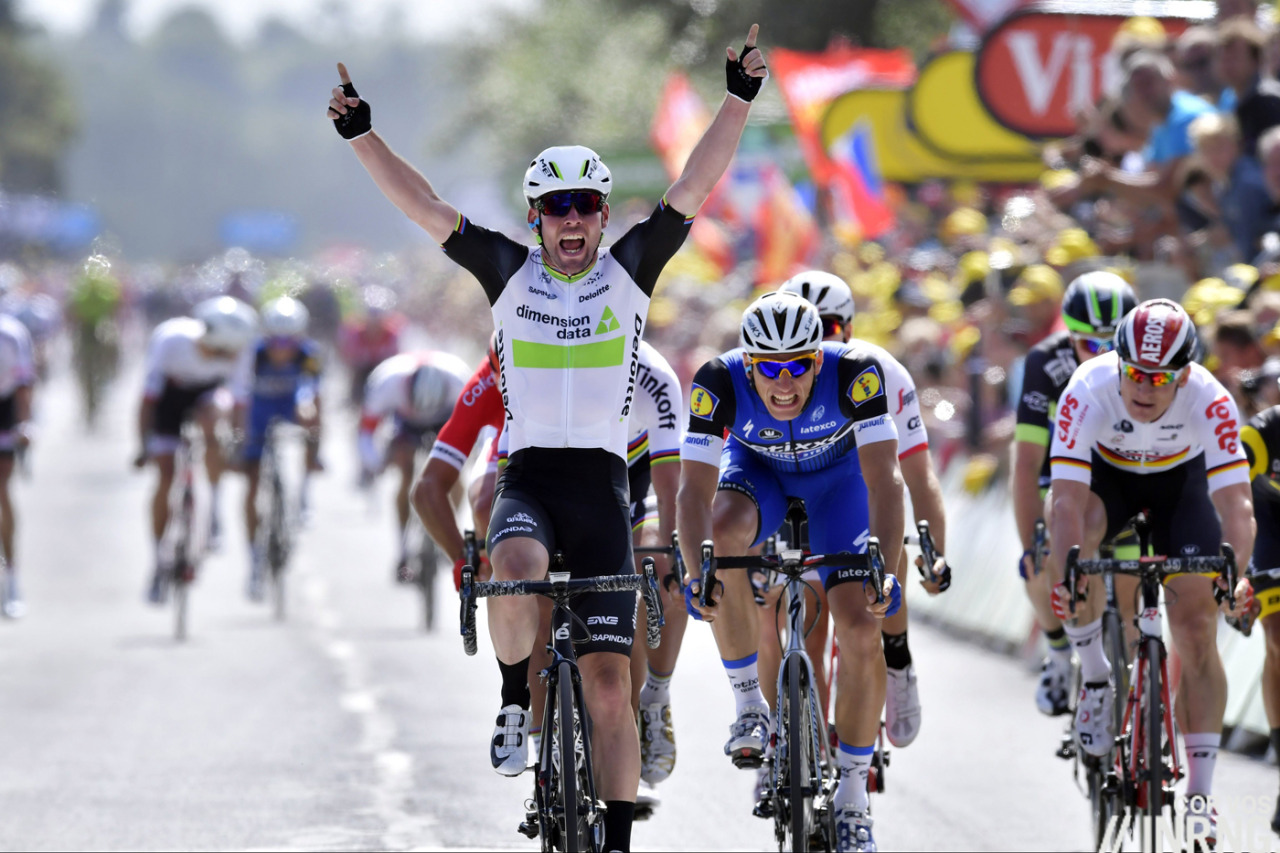
Away from the general classification there was plenty of action and it was more than a consolation for views, the battles were of the highest quality. Mark Cavendish took four wins and wore the yellow jersey, one of the few prizes in the sport that had eluded him. It marked a surprise return to form and was also remarkable for the way the bunch sprints were less dominated by sprint trains with the contenders having navigate their own way through the final kilometre.
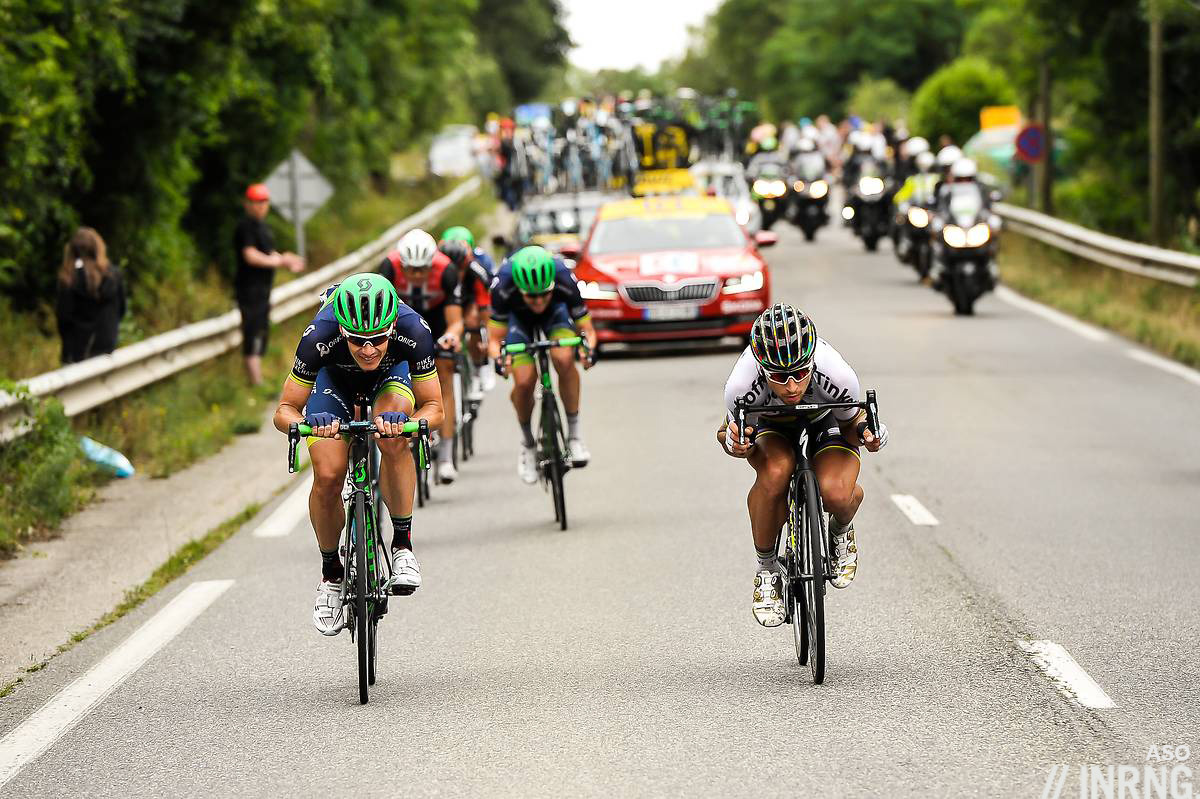
Look at the list of stage winners and it was quality every day, there were no plucky wins for the little guy and no crumbs for the smaller teams. Every time a breakaway stuck it was packed with hitters rather than passengers. This was most notable on Stage 10 when the race left Andorra for Revel and we got a Business Class breakaway of star riders, Michael Matthews won with help from his team as they found a way to beat Peter Sagan. Among all the stage winners IAM Cycling’s Jarlinson Pantano is arguably the weakest winner at least measured by his palmarès but his valiant efforts and fearless descending only speak to the quality of the winners: the Colombian was a star in the mountains.
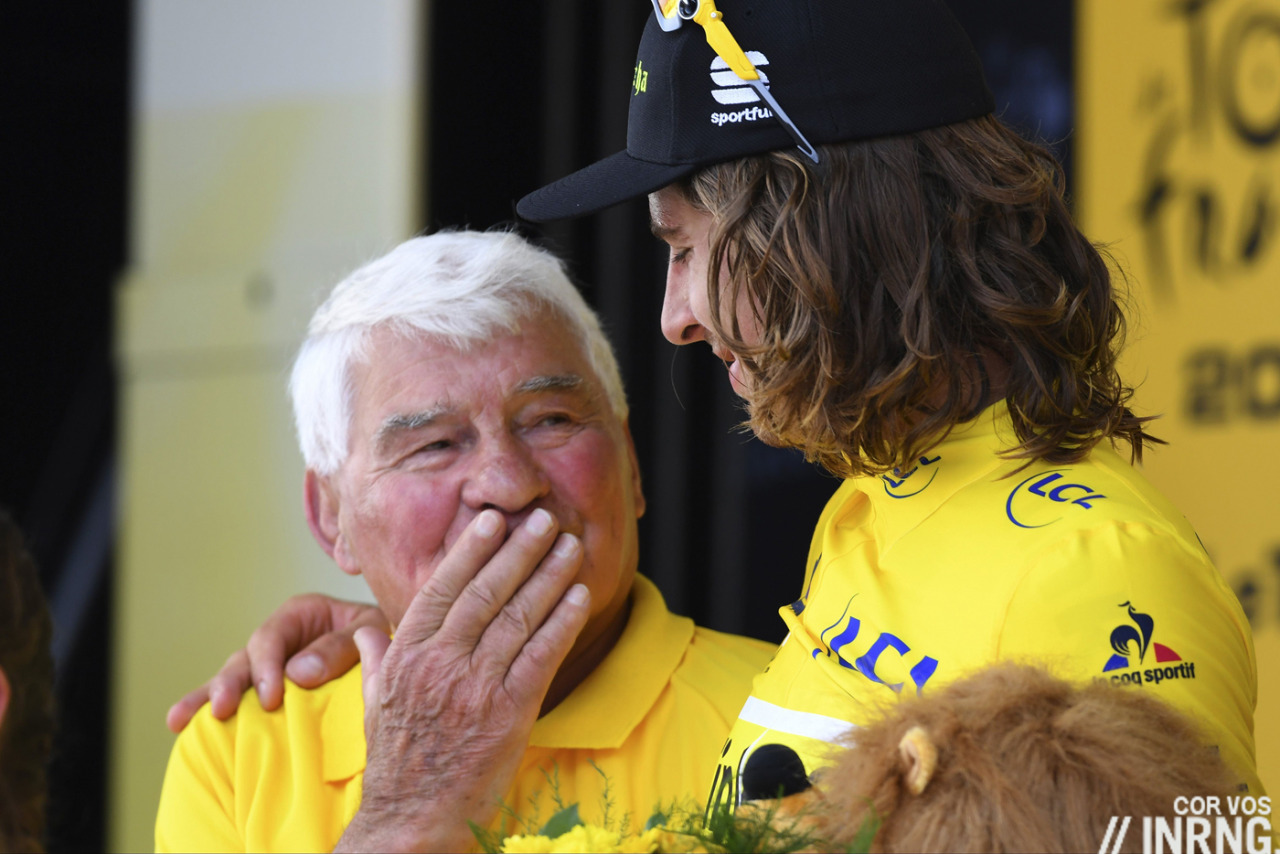
Talking quality, what about Peter Sagan? What a difference a year makes as he was Slovakia’s answer to Raymond Poulidor after so many second places a year ago. Now he took three stage wins, wore the yellow jersey and wins the points jersey to the point and we almost forget he’s the world champion because we only saw the rainbow stripes for a few days. He was also a priceless helper, infiltrating breakaways and driving the pace to help Rafał Majka and Roman Kreuziger to achieve their own ambitions. Majka especially enlivened the mountain stages with relentless energy.
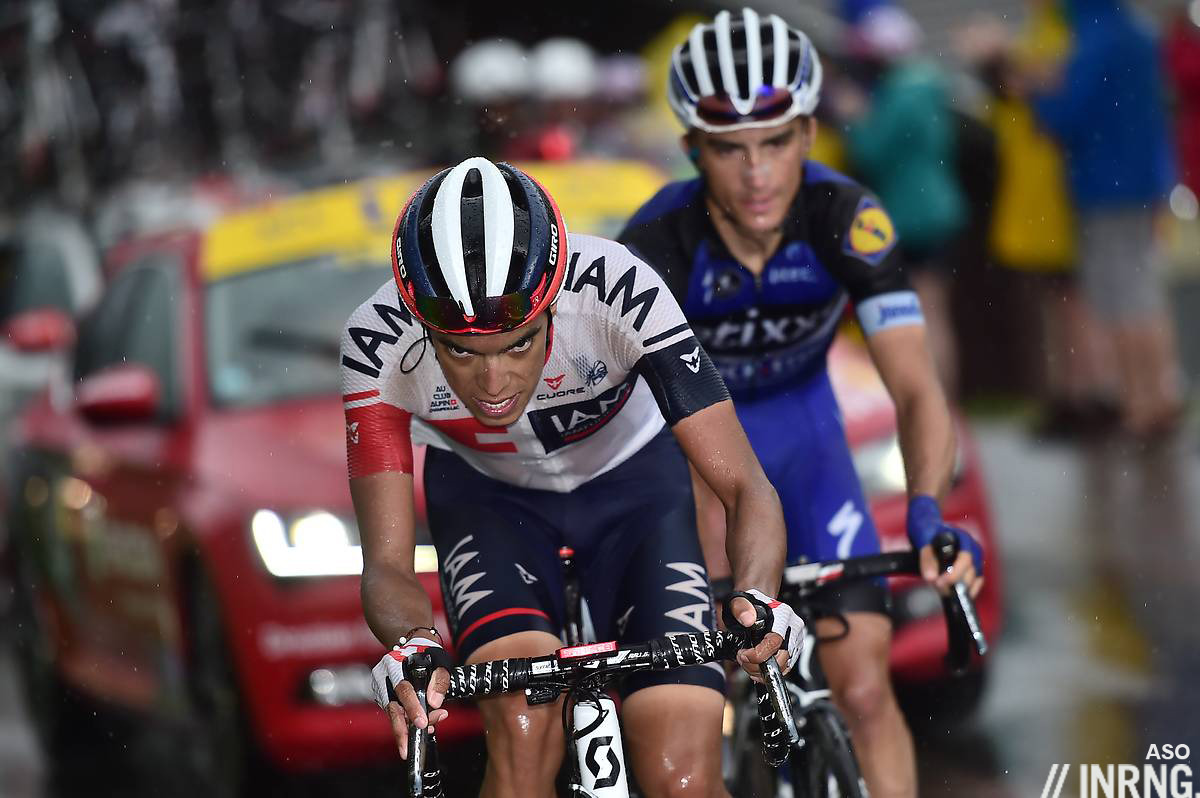
Revelations: Where there revelations? Yes Jarlinson Pantano had a great time but he’d landed a major win in last month’s Tour de Suisse. Julian Alaphilippe’s talent is not new but he displayed hitherto unknown powers of recovery to have a strong final week after numerous energetic displays; an impressive show but as veteran manager Cyrille Guimard icily remarked it was all à la Virenque because for all his flamboyance he wasted energy that could have been conserved for a win. He’s on a team that won’t settle for TV airtime and will win big soon but does he become a great stage poacher or does his climbing ability mean he’s a grand tour contender?
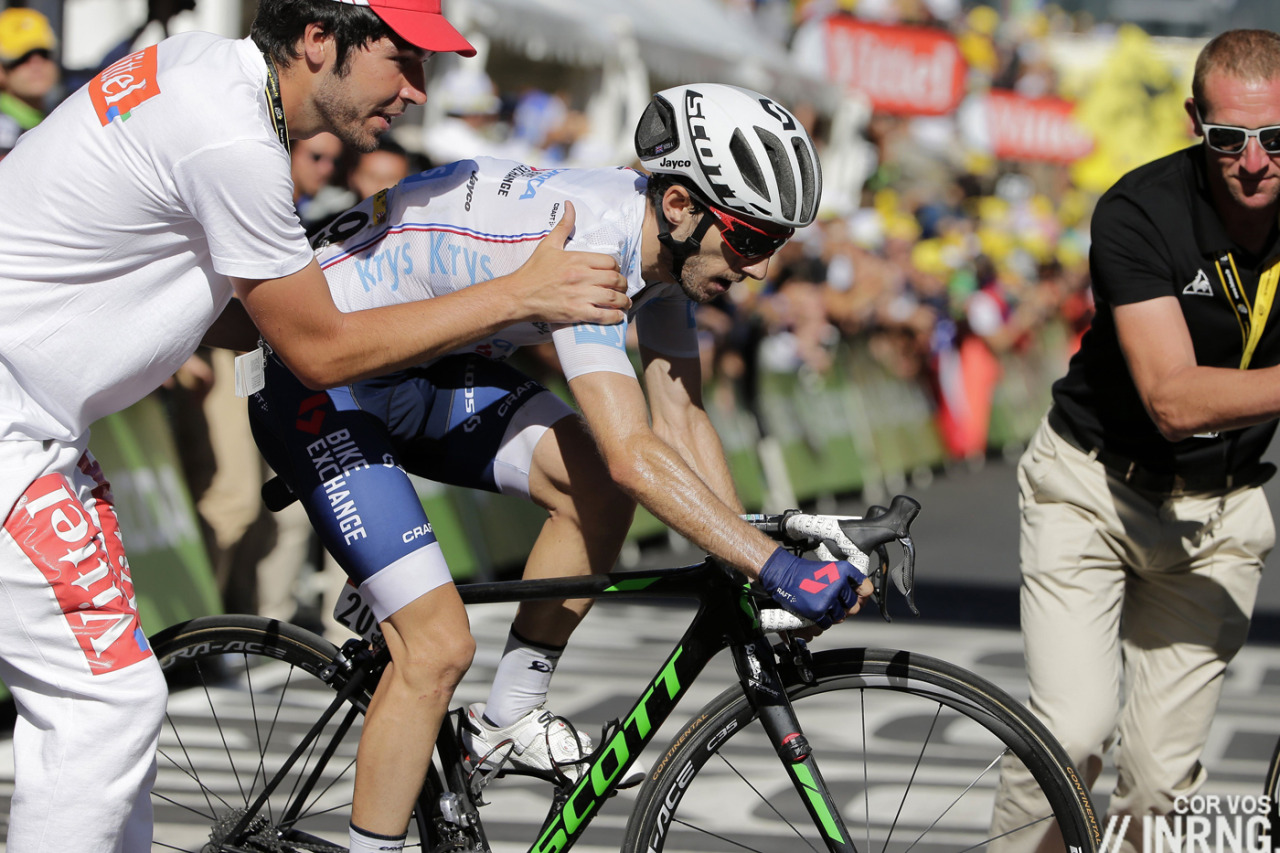
Adam Yates has to be the big reveal, tipped for years despite still being 23, he had a solid Dauphiné and hit the big time this July with fourth place overall and the white jersey, just 21 seconds off Nairo Quintana’s podium position and you wonder if a sneak attack down the Joux Plane could have brought him the podium. He probably worried it could have brought a ruinous crash and gifted the white jersey to Louis Meintjes, the other revelation. The African was runner-up in the white jersey competition aged 24 and also tipped for some time but climbing with the best in the mountains and often fending for himself while Rui Costa went on solo raids.
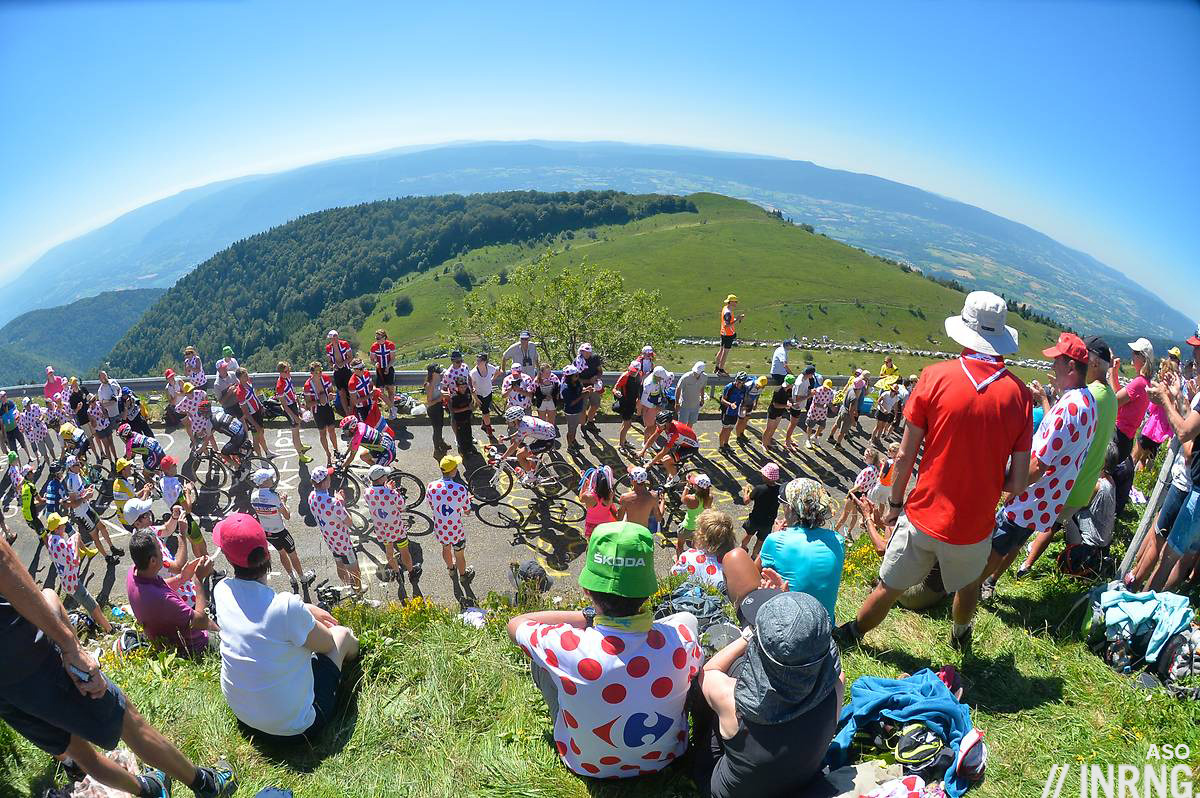
Finally a salute to the crowds. While there were a few imbeciles along the way they’re surely outnumbered by a ratio of hundreds out thousands to one. Millions cheered and they should be celebrated, one component of the Tour’s grandeur is the roadside support and the roaring soundtrack. Other sports events this month in France were cancelled but le Tour is too symbolic to stop. This is a national event that tours the country and is as much a socio-cultural phenomenon as a bicycle race. A massive police presence, overt and covert, was present, visit the finish area of a race and the crowd was packed with men in civilian clothes clutching walkie-talkies looking around at the crowd rather than the road, caravan or riders. If the race didn’t always deliver the athletic contest we crave, its repetitive presence brought a moral comfort to millions in France.
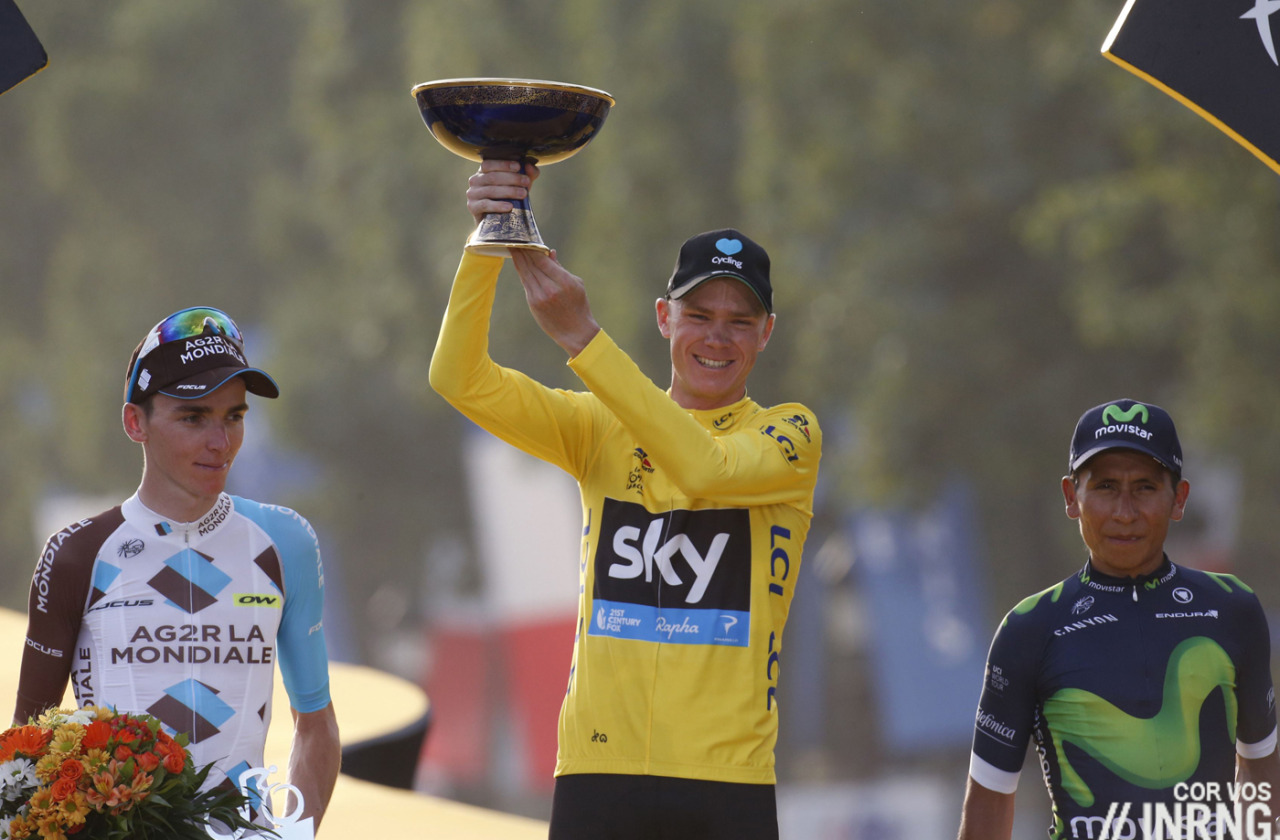
The Verdict
Three weeks of action with some great battles for the stages whether in the breakaways or the sprints. There wasn’t a single lucky break or a plucky fake. Rafał Majka proved a satisfying winner of the mountains competition and Peter Sagan was even run close for a while in the points competition before taking his fifth green jersey, one short of Erik Zabel’s six wins. Adam Yates was an impressive white jersey too.
Only once again the general classification lacked a visible contest. A vintage or Hollywood Tour requires the leader’s jersey to change shoulders often – if not daily then regularly – to give the public a show but once Chris Froome took the lead the battle faded. A hierarchy was established and the contest for first place ended but this has been the case for years now. Unlike recent editions the race for the podium continued but Froome’s team, notably Wout Poels, locked down the mountain stages to the point where those fighting for the podium spots paid for any attacks, the likes of Dan Martin would attack, get reeled in and then spat out the back. Even Froome didn’t attack successfully in the mountains. Instead he used the two time trials to distance everyone else for good. Romain Bardet found the way to undo Team Sky’s climbing strength was to use the downhills and took a deserved and celebrated second place, a moment of audacity built on top of daily consistency. It’s Froome’s third win and must be his most satisfying, not only because he joins Philippe Thys, Louison Bobet and Greg LeMond as a three time winner but because of the variety of his riding, he may have taken time in the time trials but he took applause on the descents and in the crosswinds.
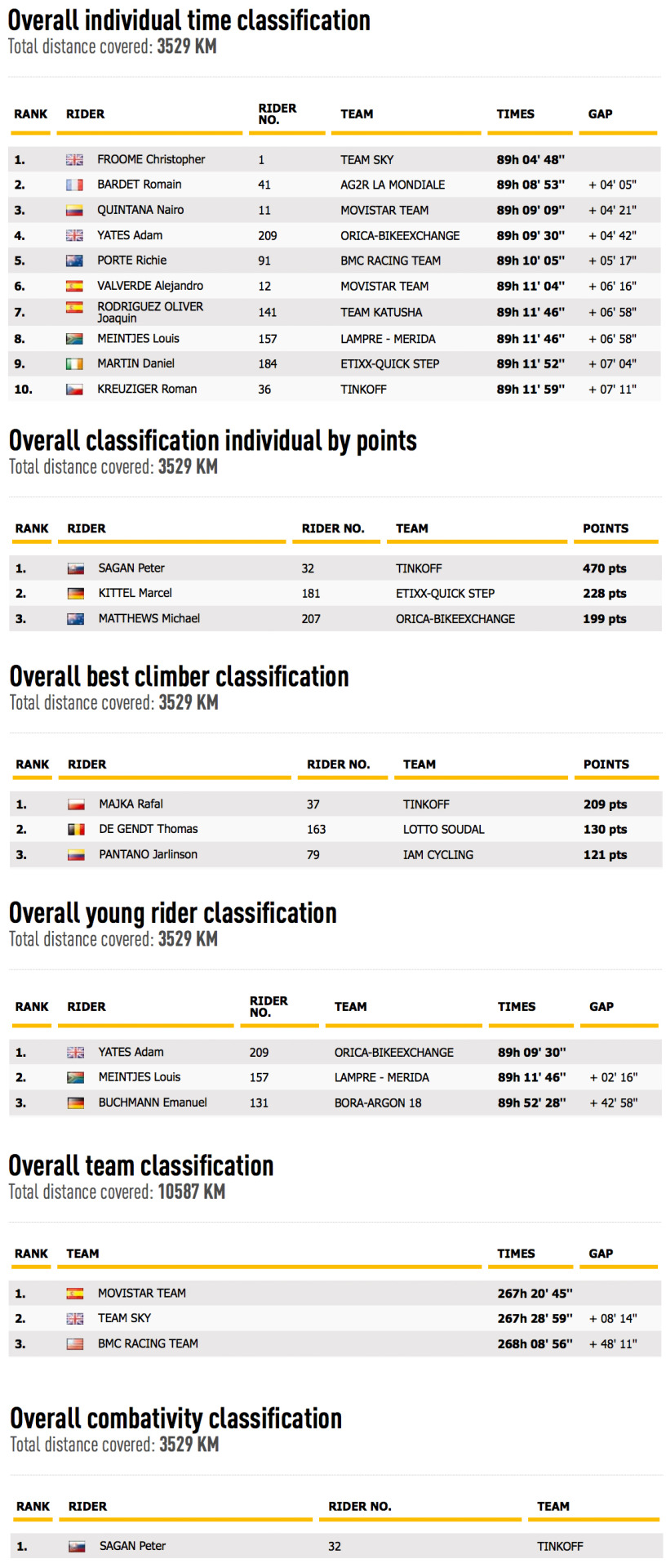

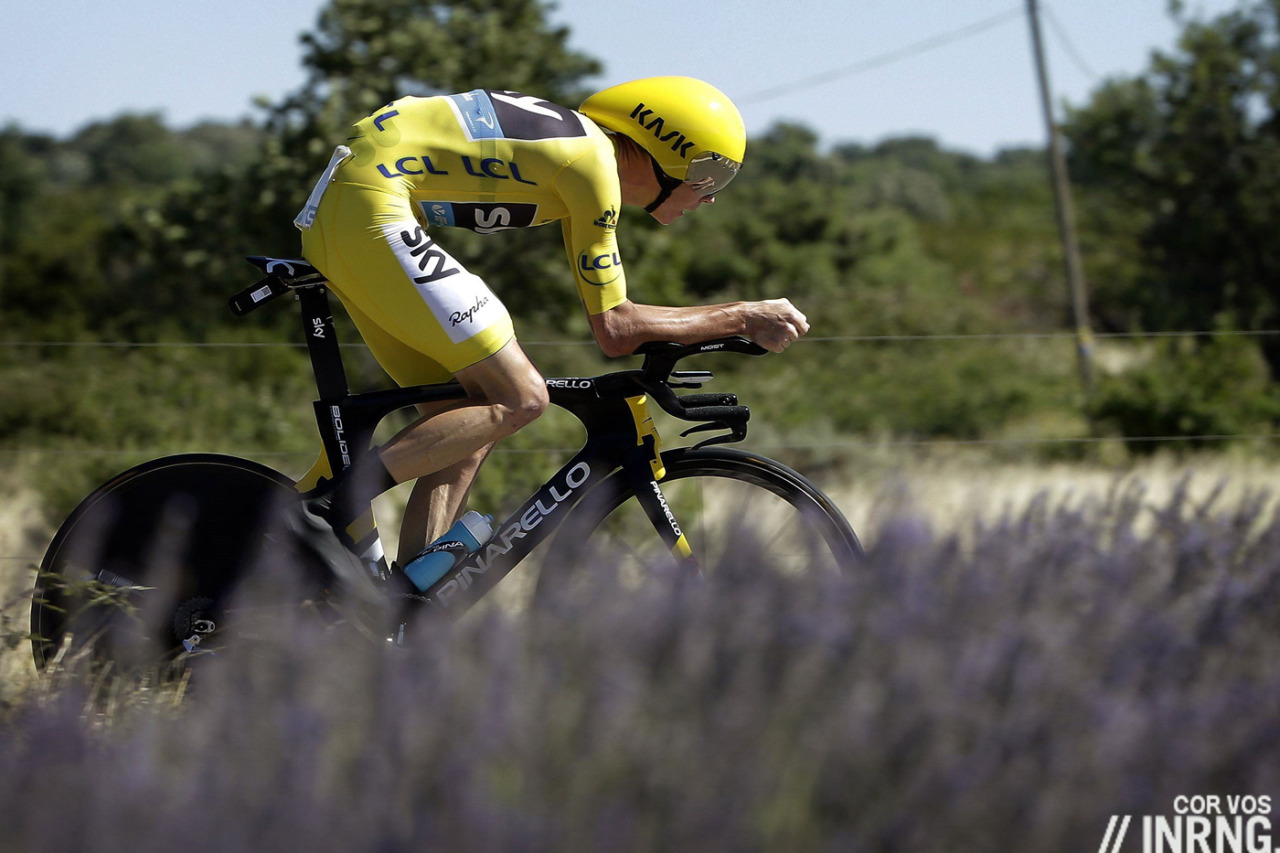
Not a vintage edition for sure, even if there were highlights day to day overall Sky didn’t so much control the race as crush the peloton into submission. No disrespect to Prudhomme but I’m not sure if 8 man teams are the answer as I’m sure Sky would have been just as dominant without the presence of Messers Stannard and Rowe.
Seems as if Porte will be re-signing with BMC and TVG will be either on super dom duties or riding the Giro or the Vuelta.
Maybe Quintana didn’t “crack” per se but he was certainly left behind with other riders in the GC group when Froome, Porte and Mollena rode away, such a pity we never got to see that stage play out on the road, instead being dictated by the commissars’ tent.
I think having an 8 man team would have to have some effect, even if it it small, its one less person leading Froome up a climb. If the teams aren’t reduced, I can’t see any other way for Froome to be beaten in a grand tour with a time trial, barring accident. An considering that he recently said that he expects to be on the start line for the next 5 or 6 years (lol), this might start getting repetitive unless something is done. Maybe time trials could be reduced to a sprinters time trial – i.e. 5 – 12 kms.
I wonder if, to try and keep more tension in the GC until later in the race next year, the Tour directors will consider having only one TT very late in the race (the last Friday for example)?
I honestly don’t think that would make any difference, for example the 2011 TDF (the last actually exciting one GC wise) had a stage 20 time trial where the yellow jersey was decided in thrilling fashion. The 2014 race also had a penultimate stage TT, but it had absolutely no GC impact as Nibali started and ended the day with well over 7 minutes buffer on second place (interestingly Nibble’s gap to Peraud one step down on the podium was greater than the total spread from Froome to 10th place Kreuziger this year). If anything the Tour should experiment with 100 or more TT kilometres which would make it competitive for riders like Dumoulin rather than the glorified KOM competition it is at the moment.
Have a TT as the final stage….it was exciting in 1989…….
+100. Exactly. Since no one was climbing better than Froome, a challenge could only have come by those superior to him in a certain area, like Dumoulin on TT. Think also of time-bonuses. Let’s imagine for a second a GT where Froome (or any other climber) would have equal overall chances than Dumoulin (or an in-form Tony Martin) and Sagan (or any other fast all-rounder). I seriously think the TdF needs a bigger dose of time-bonuses.
Okay, so a grand tour with plan flat long ITT’s and mountain stages of medium gradient will probably be the only set-up able to dislodge Froome
Sir Dave Brailsford pointed out last night that of the 20 grand tours Sky have competed in this is the first time they have ever finished with 9 men. So Froome is used to winning with less than the full compliment and I think having 8 per team wouldn’t have affected them in the slightest in this race. So he crosses the mountain top finish with four riders from his team instead of five. Big deal.
“considering that he recently said that he expects to be on the start line for the next 5 or 6 years”
I suspect Sky and Froome will attempt to top the “dirty” record of seven Tour wins, or at least break the existing record of five wins. Perhaps after the sixth win, Froome will attempt a GT double.
I’m not sure about an 8 man team. I mean, isn’t the main reason for having 9 riders is that a lot of people can suffer crashes or a team can be struck by a virus forcing a number of riders out of the race? That doesn’t matter so much in a 7 day race than a 21 day race.
Ironically the way to prevent a procession from early on is probably to put more (and flatter) TT miles in so that Dumoulin can get a lead. Which of course won’t happen because of what it would mean to the other riders…
I wonder if the amount of downhill finishes back-fired too – I definitely think the final stage being one was a bad idea. Discounting Froome’s attack on the descent which was more psychological than anything, the only downhill the created something was before an uphill finish.
Overall I found this years GC predictable, but that didn’t mean I found it boring.
That’s precisely the point. Teams end up with two fewer riders – from start to finish. Thus, the leader actually has to defend himself. Maybe they even end up racing up some hills.
There are too many down hill finishes and as mentioned on this forum before, apart from the case of somebody chasing back on or a rider already has a gap before heading down, down hill sections rarely create big differences on GC and they are much hyped.
Stannard and Rowe did their work early on in the stages and weren’t often on telly. Think they were invaluable in the crosswinds of the second week. Think I’d have left Nieve or Landa out (although that’s only in retrospect given the strength of Poels and Henao). But agree they would still have won
Agree.
Sky already upped the number of climbers compared to last year, so they surely wouldn’t have left one of the flat road racers at home.
In retrospect, they could have won without Landa – no problem. He didn’t add much.
That’s a bit unfair. Landa did a huge amount of work in the first half when he was the first one used on the climbs. He was also there in the second half, but was more often used as the one going back to the car for supplies than riding on the front.
That said, I don’t think that cutting the number of riders per team to eight would make much difference. More interesting perhaps would be copying the Vuelta’s strategy of short stages with steep climbs. These have resulted in very aggressive racing from the start of the stages rather than the war of attrition that is the typical Tour de France stage.
It would also have been interesting if one of the other teams could have tried to replicate what Garmin did on Stage 9 in 2013. They isolated Froome by racing from the start and separating him from his support. Arguably the only reason he won the tour in 2013 was that because Movistar were caught out as well they helped him back to the lead group.
Maybe the Sky team was stronger this year, but…
If you have 8 guys per team AND significant TTT, the game changes. Imagine Sky being forced to choose between bringing Rowe or Nieve.
Dump Nieve – not too big a loss. Then, slaughter all the smaller teams in the TTT.
Great summary, thanks!
Thanks for the daily reviews inrng.
It was striking watching a tv montage of the race just how much has happened, as you say it’s only the gc that has been disappointing, it is still a bit mystifying how passive it felt. A shame Dan martin and aru weren’t rewarded for their aggression.
Do you know if Sky’s rotation policy – particularly with Pouels who was in retrospect being rested in the first week – is another of their innovations? I don’t remember seeing it before.
Sky DS Portal said he’d seen it when he rode for Caisse d’Epargne, the forerunner to Movistar.
Ok. I suppose it’s a luxury strategy, one you can only use when all your eggs are in the gc basket.
Much as sky are lauded for their dominance, their ‘all in’ strategy is actually very risky. In the years when Wiggins and froome crashed out, they were criticised for having no plan b. Perhaps this is why other teams hedge their bets; you need the best gc rider to make it worth the risk.
It did fail in 2011 and 2014 although I wonder if Thomas in 2015 or Pouels this year might have made the podium (presuming the hypothetical crash occurred earlier enough in the Tour that they hadn’t already lost time by sitting up). Pouels in particular looked phenomenally strong this year.
Thomas’s form wasn’t good enough to make the top then, nevermind the podium. Even before the race – after the Tour de Suisse – he said he was no longer going to be the second protected rider at the Tour.
As Sky have Landa and Poels, not to mention a few others, it would be ludicrous nationalism for Thomas to lead the team at a grand tour.
It’s risky only in that sense. But to cherry-pick your objectives in a complex race like the TdF is, to me, falsifying the GC race. With their budget, they should have contested the gree and polka-dot jerseys, the sprints, the team classification, and everything that was there to win. To focus so many resources on only one goal (the yellow jersey) is bad for the race and bad for the fans and bad for the image and the meaning of cycling. It reeks of calculation and absolutely lacks exuberance.
Yup, but they don’t care. And they seem to have many fans on here who are gleeful at their domination of one race.
Is this a comedy post?
Excellent summary and as ever excellent daily coverage. Thank you.
Brilliant summary. Thank you so much for your coverage – I’m quickly finding it invaluable. A grand tour with no Inner Ring becoming unthinkable.
Here’s to the Vuelta being more like this year’s Giro than the Tour!
For the 5th year in a row… meh.
‘perhaps the loss and the opportunity to fight back unloaded the pressure that had previously burdened Porte?’ – is there any evidence of this inability to deal with pressure? He has faded in previous grand tours, but was that due to pressure or physical problems?
It’s a hypothesis but see last year’s Giro where the wheel change got to him and only later did he leave citing knee pain, the previous year’s Tour de France where he started the Tour de France talking about being in his best ever shape but suffered once Froome crashed.
It is the second time in Grand Tours where Ritchie has been let down by his team . first by the puncture incident at the Giro and this time in the mechanical again. Froome had a mechanical in this years tour but always had team mates around him to support i.e. G- Thomas ( ( except ventoux when the mavic service car was around – not that it helped much.
With this effort Ritchie has shown he can finish a Grand Tour in a very high position.With the right team support he will podium next year.
I don’t remember his team letting him down in the Giro. It was more a case of bad luck and bad decision making that cost him there. Taking the wheel from Gerrans cost him two minutes, the mechanical was pure bad luck.
Simon Clarke, not Gerrans.
Do we know how Dan Martin’s assistance from Team Sky on the last stage was different to Porte’s assistance from OGE in the Giro?
Martin got a wheel from a Sky team car, not from a rider AFAIK. The EQS car was busy getting Kittel back to the bunch.
Brian Holm describes the incident in a blog he shares with a number of other Danish ex-pros. A quite interesting read. But in Danish.
Porte does not have what it takes to be a champion. Great superdom though.
Superdom for Froome
Oddly enough there were Sky riders there at the time, but he took a wheel from the Aussie instead. On some of the coverage you can see Kyrienka (I think) standing by while he swaps the wheel over.
I have to agree with this sentiment. Every time he has been in a position to ‘lead’ a team he has failed to live up to the demands. Porte is a nice fellow, but he’s quiet and introverted. Perhaps the extra stress of press interviews and being the leader are not things he relishes. The incident in the Dauphine where he was caught napping on the wrong side of the Sky train sums it up – happy to follow in the foot steps of those ready to lead.
+ Thibaut Pinot for that
All those suggesting that Poels was the best climber in the race are ignoring the fact that he had a lot more rest – finishing an hour behind – than the GC contenders. Those claiming shenanigans on Sky’s part seem to forget that too.
We missed the Ventoux accident live because the director was doing what they habitually do – showing someone coming 7th on the day (nice for them, but of no interest to the rest of us), whilst ignoring the fact that the GC contest is still going on down the mountain. Show the first 3 finishing, sure.
Agree, surely in todays technology rich world they could have inset footage of riders crossing the line or focusing on GC battle. We see it in other sports all the time.
I simply do not understand the lack of picture-in-picture style displays in cycling coverage.
Thank you for an excellent round up. All the jersey winners were excellent in their category
Despite making the GC virtually uncontestable, I do have admiration for the balance and unity of Team Sky.
In my mind the Sky train is like that graphic that shows the stages of human evolution from ape to homo sapiens. With Stannard as the ape (no disrespect intended to him) and Froome as the most fully evolved, streamlined and erect standing, species at the top of the w/kg food chain.
🙂
Ha, who’s the Missing Link?
that’ll be the breakaway…. 😉
Murdoch.
Geraint Thomas’ Drain Goch/Red Dragon decal. He said as much in his interview after stage 19 when Frome had finished the stage riding Thomas’ bike.
That’s Draig
Lee Maniscalco
Thanks for the coverage Inrng – I think I count 36 articles over the race
Great point on the quality of the stage winners – underlines the ‘blue riband’ nature of the Tour de France.
I would like to see a Grand Tour without time trials (maybe an ultra-short prologue to start with some minor time differences) and see what the effect is on the racing in the (mountain) stages.
Now, it seems they are just ‘waiting’ for the time trials to decide the GC.
We had almost had one last year, only a 13km opener but without big time gaps and a 28km team time trial.
what about a long team time trial, in between the Alps and Pyrenees, say 50km plus? Nobody could pick a team of climbers like Sky have this year and rouleurs would have to be kept fresh so couldn’t be used as guardians in the first set of mountains and would be too knackered in the second? I think a really long largely flat team time trial would at least make teams more balanced and not allow the mountains to be smothered as much as they were this year. All the top men have always had someone to help them in the mountains but when one team still has 5 or 6 riders covering everything on the last climb of the day its too much.
Like the idea, but you really risk penalizing a team that has a big crash in week 1, and might not even have the numbers to make up a team time trial. (Think this is why they are normally at the beginning). No reason you couldn’t have a really long one at the start though.
I too miss the team chrono, the only time-trial stages that are interesting to watch. It also adds the “horses for courses” element. A full team of spindly climbers risks losses that might be hard to make up later while strong chrono-men might not be much help when the mountains loom. Might change the tactic of simply using your fat budget to buy up all the GT classification rivals and put ’em to work for your star – something BigTex was doing long before SKY took up the idea. LeTour was boring then (unless you were a jingoistic Yankee) just as it’s boring now. Will we ever see it as being “raced to win” vs raced “not to lose”? Is there just too much at stake these days?
A question about this idea of Sky buying up all their GT rivals: how many of the team were actually GT contenders when Sky signed them? The only one who springs to mind is Landa, who was originally intended to be their leader in the Giro, and only ended up in the Tour team because he couldn’t finish that race. Poels had been strong before, but wasn’t really at that GT rival level. Who else was?
There is a rule saying that a TTT must be in the first third of three week race, or something alongside those lines. This is to prevent that teams lose too much riders in the opening stages and are weakened. Actually last year’s TTT was too late in the race (9th stage if I remember correctly) this provoked quite some critique and another round of jabs at the UCI’s relative weakness to ASO.
Screw the UCI rule, obviously. They don’t and shouldn’t matter.
the more I think about it I think this would have locked down the race even more, Stannard, Rowe, Thomas, Kiryenka and Froome would have been pretty awsome right (don’t know about Landa and Poels). Movistar and AG2R would ahve lost a load of time right? (Porte might have had a better chance though)
Movistar would have on the basis of their team this year, but could have selected Dowsett, Castroviejo and Malori (if fit) like they did last year. AS much as Sky would have been good BMC are the reigning world champions and wouldn’t have been weakend much with the addition of Porte and TVG to that line up as they are both good testers. Also had Pinot been anything like on form FDJ have been going well in TTT’s. Quick-Step could have towed Martin round to a decent time and Lotto-Jumbo’s Giro line up would be strong in TTT’s too. The big losers would have been Bardet and Mentjes.
The idea is very interesting, IF all the teams had similar budgets.
If I remember correctly, a team like AG2R has a tiny budget in comparison to Sky. It would therefore really put the small teams at even more of a disadvantage.
Much as I like watching TTTs, we need to be cautious about this idea. If you remember, there were a number of races in the 2000’s which were wrecked by longer TTTs as a number of contenders had weak teams and lost loads of time (I was particularly upset as I was a big Euskatel fan at the time). The big budget teams like USPS, ONCE, CSC, etc could pretty much guarantee putting 2-5 minutes into a couple of potential real rivals from poorer teams. This ain’t gonna slow down Sky, however beautiful the event can be… TTT’s are great to watch, but if you don’t keep them short you effectively give Froome a 3-5 minute head start over Meintes, Bardet, etc and 2-3 over Yates, Rolland and Rodruguez.
“Froome was never attacked yet the settled view that he could not be beaten.”
Absolutely.
And of course you borrow from Zhou Enlai!
Thanks for the insight over the last 3 weeks.
Bardet’s attack: ‘Chris Froome crashed behind and this slowed the chase behind’ – that sums up the race. This should have speeded up the chase behind as riders attacked to try to gain time on the race leader.
Great round-up and as a long-time reader, I must agree that a Tour (or indeed Giro, Vuelta, Classics season etc.) without INRNG seems unthinkable. Indeed, I was away without telly access in the first week and followed the race with these daily pieces and the Tour phone app.
I look forward to the salary cap / team structure piece because I think it’s somewhat inevitable.
It is surely desirable to have the best riders go against each other, and not to have half of them riding in support of one rider. Landa, Poels, Thomas and perhaps even Henao and Nieve are all capable of riding for GC themselves.
If rider numbers are fixed then it is surely a small step to impose a squad level salary cap. The trick is regulating it, which other sports (rugby in France, for example) have found difficult, with clubs finding ways to get around it.
With regard to the mountain stages being devoid of attacks that actually stuck is it a case of everybody knows what is required to get up them as quick as possible. I.e. everyone knows that you have to hold 400 watts/6.5watts per kg for 20 minutes, and all the leading guys in the top 10 train for this and can do this. In order to attack and gain significant time you’d need to do 500 watts for 15 minutes and thats just not possible within a 3 week race without a serious down day the day after. Therefore they only unleash their 2 minute max power interval in the last KM and hope to gain a second or two. The result is the only changes you get in the top 10 on these stages result from accidents or somebody having a jour sans where they just cant hold the watts for long enough, and changes come out the back door not the front. Like with Aru on the last day. That leaves the time trials, and in a top 10 dominated by out and out climbers Froome had no competitors in these. What we need is someone who can climb well and time trial well – i.e. a proper all round GC man. Fingers crossed Tommy D steps up to the mark to liven things up over the next couple of years. If you think about it its always been the same. I’ve been watching the Tour properly since 1997 and then it was Ullrich who murdered everybody in time trials, and Armstrong for all his flashy attacks on climbs usually won it in the TT’s too. Maybe as a suggestion to mix the race up a long Team Time Trial would do the trick as nobody could pick a team of climbers then. Though Sky would likely dominated that too!
Or could you find climbs where drafting effects are much reduced – either because they’re very steep or very bumpy?
A long team TT would hugely benefit the big teams – imagine how much time Sky would put into the likes of Ag2r.
I agree with your watts comments – all the more reason to get rid of powermeters. They’d still ride like this, but at least they’d have to use their own judgement – and there’d be more chance of human error.
A long team TT and a salary cap then?!
There was a decent TTT last year. Sky came 2nd on the stage by fractions of a second to the world champion BMC team. And Froome won the race.
And this rider “who can climb well and time trial well – i.e. a proper all round GC man” is already in the peloton. His name is Chris Froome. Tom Dum needs to improve his climbing and consistency before he can be a genuine challenger. At the moment you get the feeling he’s hoping for long flat ITTs and then seeing how far that can take him. He also needs support because surfing the wheels is a dangerous game and you’re sure to be left in the lurch sooner or later.
Yes, my point was there needs to be another to challenge him
Seems like the chatter of a few years ago calling for banning power meters in races has died away for some reason? Nibali, for example, was one rider who was quite vocal about doing away with them in races. Personally, I think they are largely responsible for the predictability of racing, particularly on uphill finishes. Let ’em have them for the TTs, I suppose, where technology is the name of the game but the allowance of power meters has effectively turned the mountain stages into TTs, in my opinion.
What happened to the final GC? Originally, Rodriguez dropped having lost time and Froome’s gap was shortened due to sitting up at the end?
There were crashes in the last 3 kilometres and the jury decided to apply the 3km rule. The communiqué for stage 21 says, “Suite aux nombreuses crevaisons et chutes survenues dans les 3 derniers kilomètres, les coureurs retardés par ces incidents sont crédités du temps du vainqueur” (see page 14).
That is, “Due to numerous punctures and falls in the last 3 kilometres, the riders delayed by these incidents are credited with the time of the winner.”
Only that there was not very much to see of “numerous punctures and falls in the last 3 kilometres”. Last 3 rounds, well, so fell, single riders though. Last 3 km I recall one rider crashed. not more, no mass crash and road blocks
I call it a bit made up excuse by the commisaires.
What happened to the original time gaps at the end of the Champs Elysees stage? There had been some gaps in the peloton and I think Meintjes had gone up a place or two as he was in the right group? But the official result keeps him where he was after Stage 20? Did they use the 3kms rule?
The original results that went up seemed to be based on the time across the finish line but were revised afterwards, apparently the finishing times for the race were taken with 1 lap to go and I’d missed this at the time / don’t think it was in the previous day’s bulletin.
Many thanks and a hearty – Chapeau! – to you Inrng for your excellent coverage. Yours is far and away the best cycling blog going and I can’t imagine the season or the tour without it.
I would just like to also say that I really enjoyed this year’s tour and it is a shame that so many others find it boring. I found Froome’s attacks refreshing and his attitude too, Cav’s resurgence was a real surprise, Sagan actually winning stages and sprinting with the best was great, the battles for the lower podium spots were exciting, Pantano was a revelation as were Yates and Meintjes – and as you said, all the winners down the list were absolute quality. I’ve looked forward to every day’s racing and have not been disappointed for 3 weeks. Thanks again Inrng for giving me something to look forward to reading every morning!
Agree — I too thought there were numerous fun-to-watch days, and great rides and riders to thrill. And INRNG’s daily posts bring all this to life, too: hearty thanks!
As for the GC, how often in the post-war past has the GC competition really been close? I vividly recall Hinault v. Le Monde, for instance, but were the mid-1980s unusual?
Is this something that they normally do? I mean, there is still a race going on. If for whatever reason (crash, puncture…), one of the top 10 was distanced before the last lap, he would lose time, so why not during that last lap?
OK, I can see from Gareth Rees’ post above that it’s just a normal use of the 3kms rule.
Great summary, thank you inrng! My highlights were Cav’s win to get him the yellow jersey, Bardet’s attack, and those few precious seconds on Ventoux before the moto stopped where Bauke Mollema was a genuine contender and it felt like a real race was on.
Is it just me, or is anyone else fed up with how the TT has been neutered over recent years. We’ve gone from 80km+ to distances not much more than a prologue in under 30 years. Clearly a return to “proper” TT’s is going to benefit Froome, but in my eyes you want the strongest rider to rise to the top, not just those with exceptional w/kg.
Historically, tours had a balance, and riders could expect to gain/lose time according to the parcours. Clearly, advances in teamwork and other areas have removed some of that variance, but i want to see a Tour where it’s not tipped towards riders that are 60kg wet through. Put in an 80km TT and all of a sudden Tom Dumoulin is a threat to Froome. There may be few other threats in comparison to a plethora of lightweights these days – Contador now fading, Porte close, a healthy Teejay not a million miles away – but at least the evolution will be towards the mean (in terms of weight, height etc) and not massively skewed to those more diminutive in stature.
After all, France is mostly flat, and indeed the TdF didn’t even feature mountains originally, but it would be a nonsense to have 3 weeks of terrain in which Cav could have a shot at the final yellow – or would it?….
Remove the TTs this year and the GC would have been a lot closer, at least in arithmetic as without them perhaps the race could have been done differently. One factor behind the vanishing TTs is that they’re a TV ratings problem, perhaps enhanced production can help tell the story but until then a lot of the audience doesn’t tune in.
As I was watching the TT, I thought there is SO much more that the producers and Didata could do to make the TT more ‘live’ and interesting than it was – with all the near-real-time data they have available now.
I can think of more than a few mountain stages this year that were less exciting than a TT so if gripping television is the aim axing the chrono stages isn’t the answer.
You fail to mention the harm done especially to TTs by power-meters.
One relatively easy way to spice TT up for TV would be to split the road in half and then run two riders side by side. Would obviously need some careful route selection. The separation could just be the painted centre line with a time penalty applied for crossing it.
Not sure it will ramp up the overall GC battle, but could prove interesting if you had tight margins towards the back end of the three weeks. Just imagine the situation this year after say Stage 19 going into a TT on Stage 20 with Quintana and Yates split by 20 seconds, Meintjes and martin by 8 seconds, Mollema and Purito separated by 10 seconds. I reckon I would watch that.
A healthy Teejay was a million miles away this year. Again. He doesn’t have it.
A little harsh/unfair – but i hear you. I think both Porte and TVG would be well advised to try and win a Vuelta or Giro instead of basing their whole seasons on what is in effect a big outside bet for them both. To at least podium in either is something recent Tour winners Froome, Nibali, & Evans all did before they picked up the big one!
Agree that TJVG/BMC need to re-evaluate his capabilities.
He should of been included in INRNG’s revelations: TJVG not suited for the TDF.
I believe Porte is capable of competing at TDF GC level.
Cannondale was MIA
Thanks INRNG, epic coverage.
If you want a long time-trial, I say make the aero bars illegal. With them the big guys with big engines are just as aerodynamic as the little guys. I’d like to go back to the days when little Charlie Mottet could fold himself up enough for his smaller engine to push him faster than the big boys who just couldn’t make themselves aerodynamic enough. I’ll always wonder if the boring BigMig years would have been much more interesting (unless you were Spanish) if Mig’s chrono advantage, provided by the aero bars, would have been eliminated?
each rider gets one road bike that has to last the month (with no snap on tri-bars), no power meter and no radios. Ok, they get to change wheels when needed.
One “trick” you’ve missed, with your thinking – limit each rider to 2 drink bottles per stage.
They can’t throw their bottles away on the stage – refill only.
That’d slow a few down!!
I blame Big Bidon corporatiions 😉
In a way the TT’s are the worst stages to watch… I agree with those saying that a long TT would put the GC battle way out of reach too which would contribute to the boring GC battle.
Other than levelling the playing field with some sort of budget cap, I can’t think of a way to make this more even.
Actually, one way would be to change the formula for prize money. Right now the richest team by far took home the biggest prize.
prize money in cycling is pretty irrelevant (tiny in context of team budgets) so this is not a case of the rich getting richer.
it is possible that having big prize money could help as a team like ag2r operating on tiny budgets (relatively) would get a big boost from Bardet’s 2nd.
I don’t buy the “sky’s doms can be leaders elsewhere and win a GT themselves” line. To me it is the same as sky’s “innovations”, which have been debunked as old cycling or sport-stuff time and time again. They are good at impleminting them, at streamlining and at PR, although to me it is debatable, if this is to be welcomed in a sport. But that’s another debate. No, what I mean is:
We had the same with Postal, where it was said some riders riding for armstrong could win the Tour themselves or lead a team. And when they were allowed, they did just that, they became leaders. Some even at very good teams. With very mixed results. The only exception is Heras with two Vueltas to his name. And it showed that they were good cyclists, but that doesn’t mean you are a teamleader in a good, strong team and it is far away from winning a GT. I don’t see anybody building a WT-team around Landa,König,Poels,Kyryienka or Kwiatkowski as it is done with Contador, Nairo or Aru. On the other hand, I can see other teams buying them as helpers or backups, if your first GT-hope falls through, anytime. Just that a person gets paid a lot of money, doesn’t mean he/she is worth it.
The main emotion I am left with by this Tour is frustration. Frustration about the media and teams (one team tweeting today about this “epic Tour”). It seems independent thinking and questioning things hasn’t only become a rarer trait inside the rider-peloton, but also in the journalist-peloton. One thing I find interesting is the Bardet/team car moment. Before I never thought race radios are such an important thing in the change the racing has undergone. But maybe I’ll change now my mind. If Bardet had listened to his DS,he would have waited like the others – and suddenly they run out of kms to do anything, as the finishline approaches. I do think the Olympic games had an impact on this Tour, as riders seemed to be very concerned with taking no risks. But racing means risk taking, so that was counterproductive.
And I’m not so sure this Tour was really won in the TTs. I understand, what you mean, that this was where the difference was made, but that were onle 2 days. No, I think the race was won on every stage sky rode the peloton into submission. As much as people say:So and so must attack – if the speed is so high, permanently so high, that is simply not possible. And the only decisive GC-attack in this race wasn’t really made up a mountain, but down, so it doesn’t unhinge this argument.
I too think the permanent bashing of the people roadside is beside the point. There are 12MILLION people roadside. Even if 200 should behave wrong, this is mini,mini,minimal. I found the many, msny smiling and cheering people this year even more impressing and beautiful than ever. I think you could see just how much the people need healing, normalcy and joy. There is no and will be no 100% solution to people acting foolish, as long as road cycling stays a sport happening in the outside world. Important thing is to learn for the future and I think this will be done. Unlike others experienced it, my Tour-experience wasn’t so enjoyable, but I still love the race and what it stands for.
Uiii that are many words. Sorry! Chapeau to everyone making it till here!
your 200/12 million ratio is a valid point, however there does seem to be a proliferation of fancy dress/flag waving mostly apparently drunk men who think running next to riders while simultaneously ensuring they are getting plenty of camera time for their mates at home to laugh at…. and all the while weaving about not really looking where they are going…. maybe it’s always been the case, but it’s a miracle it didn’t effect the race more than it did – I’m not sure what the answer is however… I’d hate to see the race barriered off for km after km (and I imagine the cost would be prohibative…).
One of my favourite moments of the Tour: when a drunk ‘runner’ is tackled and flung off the road by a respectful member of the crowd 😉
+1
…or punched by a rider 🙂
I remain unconvinced by the idea that Sky “ride the peloton into submission”, so hard that it’s impossible to attack. If anything I think they ride a decent tempo but not overly hard, as I don’t think Froome really likes full gas over multiple climbs (his best mountain time gains have been stages with one long climb to finish; Ventoux was the only time this year he got away, albeit with Porte and Mollema). When Astana made it a ‘2015 Giro’ type stage, Froome didn’t look comfortable, even if he didn’t lose time; on the last climb the Sky train barely put any time into Zakharin on his breakaway stage win; and Poels was visibly slowing down the group on stage 20, admittedly after Froome’s crash. That’s not to say they don’t ride hard, just not impossibly so. The question then is why didn’t or couldn’t the others take advantage of his “weaknesses”, such as they are? They simply weren’t good enough, whatever the reason and Froome’s TT gave him plenty of buffer regardless.
It’s hard for us to accurately comment on how hard Sky’s climbers ride tempo. We can debate all day if Team Sky’s climbers were riding at a suffocating pace, but all we can accurately look at is the result. The fact remains that none of the GC men initiated and maintained meaningful attacks on Froome that his team couldn’t really control. Most of the long and difficult mountain stages turned into processions, processions behind riders who were technically domestiques!
That is indisputable, and just shows how far the other GC men went into their reserves just to follow the wheels.
I do strongly suspect however that Quintana peaked in June… he seemed like he lost that edge in July.
I got the feeling maybe Quintana was overtrained..
he had decent base level, but had nothing like a top end speed to really go on the attack – as seen by his Ventoux mini-dig and fade.
The guy has pressure of whole nation behind him, maybe heading to Colombia for altitude training needs to be reconsidered. OK – those are mountains and terrain he knows, but it can only add to the potentially suffocating mental strain of needing to win Yellow.
Rumors of a virus or allergy might confirm he wasn’t at peak condition.
Got a feeling that the Tour was potentially too hard – SKY went in with tactics to control the mountain stages, not wanting every day to be totally chaotic (maybe the worst it got was Ventoux and the rainy stage when Astana tried something). They knew they could get serious time in the time trials, so rode defensively in the mountains.
In contrast to that, the tactics in the Pyranees and the crosswinds show that they were not sure of the win as it appeared. Froomey clipping off the front for 20s… is insane for a GC contender, oh the element of surprise PR… but i think they were concerned about how it would play out in the Alps. In the end, weather, form and crashes contrived to rob us of any real fireworks on those stages.
“I too think the permanent bashing of the people roadside is beside the point. There are 12MILLION people roadside. Even if 200 should behave wrong, this is mini,mini,minimal. I found the many, msny smiling and cheering people this year even more impressing and beautiful than ever. I think you could see just how much the people need healing, normalcy and joy. There is no and will be no 100% solution to people acting foolish, as long as road cycling stays a sport happening in the outside world. ”
I don’t know about this. It’s always the idiot minority, the outliers, who are the most visible, regardless of which sport you follow.
For example, thousands of England football fans follow the national team (or individual club teams when playing in Europe) without incident but the minority who fight or hurl plastic cafe furniture at police are the ones who are noticed and talked about. See also at test cricket matches, when parts of the good-natured, slightly-sozzled summer fanbase decide that making a Beer Cup Snake of empty cups is the best idea anyone’s ever had. Everyone else is irrelevant, it’s the abnormal behaviour that is noticed.
I for one can’t stand the crowd behaviour on the mountain slopes. It must be related to the low speed at which riders pass, coupled with sitting there for a day or more drinking. Perhaps we could have a Voiture Balai* for the fans; behave or be bundled into the back of the van and escorted off the mountainside. As much as I wish barriers wouldn’t be there for a longer part of the mountain stages, Ventoux demonstrated that it may be necessary at least on some of the more iconic climbs.
*Interestingly for me at least, a Google Image Search of the term gives photos of french wedding/honeymoon cars, a use of the term I’d never come across before.
so Cannondale’s final prize pot for the entire team for the entire race was €14k…. oh dear, come on JV sort it out!
It’ll be interesting to see where Michael Drapac’s dollars get spent.
I would love to know how all that came about – can you point me to any articles on the Cannondale-Drapac combination, explaining their motives and goals?
This is written pre the full announcement but it is the fullest explaination I’ve seen of how/why this might work and some issues that might need to be resolved going going forward. (It’s an Australian website so is coming at this from a more-Drapac centric angle).
http://cyclingtips.com/2016/04/what-does-drapacs-partnership-with-cannondale-mean-for-its-existing-team/
As I understand it, Drapac utilised Vaughters property/investment connections,
to improve his business standing in the USA.
The collaboration between the teams, is due to kick in, so to speak, in 2017.
On a taxi for JV wouldn’t be a bad idea. What a shocking manager he is.
On a taxi for JV wouldn’t be a bad idea. What a shocking manager he is. If he was employed on results he’d have been out a long while ago.
That’s fun, I’ll play too (it’s like “Koffer packen” in german, adding always something):
On a taxi wouldn’t be a bad idea. What a shocking manager he is. If he was employed on results he’d have been out a long while ago. Before he could survive through snapping up other teams and continue to always loudly blame everybody else for everything.
Who’s next?
I’d love to play. I can’t stand JV; he was a bush league cyclist, a bush league doper and he is a lousy manager.
BUT, Cannondale is probably what a mostly clean team looks like. Ryder proved they’re not spotless, but a lot probably are. If Riis or Lefevre were in charge they would be a better team for sure, trickier and more opportunistic. Only an idiot would think that a clean team could compete in the big leagues. JV is an arrogant idiot.
I think vaughters biggest ace and the reason why he still has a team is his nationality and the market he can tap into. Without that I don’t think his team would have come out 3 times as the “winner” of mergers with other teams (winner is not what I mean, but don’t know how to put it differently). Personally I doubt he would still have a team, if he’d be italian or french. About that “cannondale is the only clean team”-bit I am very sceptical. I think there are others in the peloton, too. The way the Tommy D case and the “one positive case and we close”-thing were handled very poor. And so on. If he left the sport, I’d be more than happy. But I do like some of the riders in that team.
Unrelated to anything, looking at the results of the Tour-podium, I found 2 interesting angles: • AG2R and Movistar managed to get two different riders on the podium in the last three editins. Mighty, mighty impressive!!
• Nairo Quintana rode 3 Tours and this year’s 3.place is his worst result. Wow!
Oh, and to that budget-list: I presume those are the numbers of 2016? But the numbers of the sky-finance piece on this blog were for 2015. So a little deviation might be possible and explicable through that?
anoymous: good point in the US card, it’s valuable. On the team numbers, Ag2r’s budget for 2015 was €14.1m and it’s risen since so the €12m number is old, maybe 2014 or 2013?
I’m not JV’s biggest fan but I’m not sure you can say based on results he would be out. 1 grand tour and 3 monuments isn’t a bad return for a small team in they years they’ve been going. Some comparable budget teams have done better and some worse (Ag2r, FDJ, Lahore, IAM).
Also he has kept the team going which when you consider the teams which have come and gone since he started is an achievement in itself.
I feel like JV deserves credit for what he has done on a shoe string budget. If anything he has set expectations higher than the should be. His team has not been as successful this year as hoped, but injuries and sickness happened at the wrong time. He is a US based team that has to raise real money in a country where cycling is not supported by the general media.
In addition he has been a positive element in moving cycling forward. Maybe his ideas or presentation haven’t been perfect, but they do make good sense.
To emphasize the point on budgets :
Team Sky – €35m
Katusha – €32m
BMC – €28m
Tinkoff – €25m
Astana – €20m
Etixx-Quick Step – €18m
Movistar – €15m
Lotto-Soudal – €14m
LottoNL-Jumbo – €14m
Dimension Data – €13.5m
Orica-BikeExchange – €13m
Giant-Alpecin – €12.5m
Trek-Segafredo – €12m
Ag2r La Mondiale – €12m
Cofidis – €11m
IAM Cycling – €10.5m
FDJ – €10m
Cannondale – €10m
Lampre-Merida – €7m
Direct Energie – €6m
Bora-Argon 18 – €4.5m
Fortuneo-Vital Concept – €3.5m
(courtesy of cyclingweek.co.uk)
This list is doing the rounds and its full of errors, so it’s useful as it shows the spread between teams but every team listed for which I have a copy of their annual accounts is wrong and off by millions.
Agreed and this list does more harm than good. There’s plenty to discuss as regards cycling budgets without creating dubious figures and statistics then publicising them.
Any indication at this point what the finances of the Bahrain team may be?
It’s probably a truism to say that the Arab mentality is to be biggest and best.
My take on the predictability and the demads for Quintana to attack is that this is the nature of the race. the Tour is for a GC contender the pinnacle of their aspirations, In any other race they may think “to hell with it only a win counts” and will be prepared to make an audacious move.
One reason that Contador is seen as so aggressive is that he’s won before, a podium doesn’t mean anything to him so he’ll do everything to win. To Mollema, Yates, and Bardet a Podium means so much they daren’t jeopardise it with an attack that might see them out the back (like Martin and others did).
By the same token people look to Quintana because he has nothing to lose, if he win’s he’d be a hero, if eh looses – well he’ll still be amongst the favorites next year, have won a grand tour before and be the team leader.
In this respect the Tour becomes predictable because it’s a victim of it’s own success, the more prestigious it is the more conservative the bike racing becomes.
+1
It is also why the Giro has become such a great and exciting race over the last few years, with this year’s edition being simply spectacular.
And the Vuelta is often even more fun because it gives a chance for some ‘unknown’ riders to show their stuff….
+Me Always a interesting mix of contenders in the Velta.
I agree with the sentiments about this race: Team Sky had the best team, they controlled it as best they could, excitement was had due to Froome taking risks, but none of the contenders showed enough form to get close and challenge. This has often been the way when a rider starts to dominate the Tour.
The only way to enliven things is where circumstance plays a part – wet slippery roads causing a crash, cross winds, cobbles and crowds. My only other thoughts for making things more dramatic is mix the stage length up so that riders have to deal with long and short stages (which tend to give rise to some more lively racing); or reduce the number of mountain stages so that riders are fresher and can have one good day which gains them minutes on the GC (a la Voeckler).
Personally, I think the mediocre performances (relatively speaking) by the GC contenders on the mountain TT speaks volumes. Quintana has previously gained time, but not this time
+1 Mix up the stage length
The sheer length of some of the stages made it impossible for GC attacks from the start of stages and made it easier for Sky to keep numbers around Froome. In many of the mountain stages Stannard and Lowe were still leading the peloton over the second and third climbs.
Think Stage 9 in 2013 and Stage 19 in 2015.
The parcours is generally very different in the Giro and Vuelta with shorter sharper stages which mean there is more variety to the racing.
I’ve been looking at the 2016 parcours for Giro and TdF.
The Giro was longer; averaging 190 km / stage over 17 x stages (not including 3 x TT’s and last day).
TdF was 166 km / stage average, over 18 x stages (2x TT’s and final day).
The Giro had 6 x mountain stages, at an average of 160 km.
TdF had x 7, at 168 km average length.
There’s probably no magic fix. If Sky had taken that TdF team to the Giro, we’d have probably seen a similar result. Barring illness / crashes – and even then, whilst the weather at the Giro produces *things*, it does so also at TdF.
OK, here’s a crazy idea. Non-team stages!
So: the best-placed rider in each team only, race a stage. Maybe the best 2 or 3.
No doubt there’s a squillion flaws in this idea. Might be fun though!
Hmm, I’m liking this idea. Going further:
The peleton is whittled down in size every 4 days or so. It’s only the best placed riders in each team so you don’t end up with say team Sky have 9 riders others only have 5. Reduces the incentive for buying the best team.
The tour builds to a crescendo and the riders left are on the ragged edge and all ganging up on each other!
I realise this isn’t really a ‘grand tour’ any more but it might be more fun! And maybe squeezing exciting racing out of the traditional format isn’t possible, with increased professionalism etc.
Nice mention of Pantano but also wider kudos to IAM for the way they have approached the last few weeks of racing. Not easy to stay focussed as a group when the team is disbanding, but rode well for Holst Enger, Howard was impressive in the breaks for a late call-up and two riders in the Top-20, including a superb ride from Clement.
Good someone mentioned Stef Clement. That kind of came out of nowhere didn’t it!
Totally. His 12th GT in 11 years of being a pro and never finished higher than 32nd (2007 Vuelta!).
This year’s Tour is over! What will I do with the rest of my summer? Thank you, Inrng, for your astute reporting and all the discussions.
Regarding teams, why not reduce team size to 6 or 7 but allow limited substitutions? This would allow for a smaller peloton (or more teams) but not deplete teams due to crashes. I would love to see teams substitute back in their top sprinters just for the final stage!
Inrng.com superb once more, I love the way that your write and the debates that take place in the comments section are excellent.
The tour this year had it’s moments, Froome running was a particular highlight. Watching the Sky train pump out the 400+ watts required did not make for a particularly great spectacle. But you can’t blame them, they look at the course assemble the best riders to suit their GC man and formulate a plan to win (and barring crashes and injuries). For racing action I tend to watch the Giro and Vuelta, and to be honest the women’s tour is quite exciting. Just on that note, and I admit that I may have my facts wrong…but if the women’s tour is serious about rekindling the Tour de France then surely La Course needs to attended and supported by all of the top female riders even if the schedule has it straight after the Giro and a couple of weeks out from the Olympics?
I imagine female riders have the same issues and considerations that male riders navigating their own extremely crowded racing calendars have (e.g. no point turning up to La Course if you’re generally a climber; concern about the number of crashes last year [due to unusually bad weather but still] if you’re an Olympic contender)
I’m sure a lot more will turn up IF a women’s TdF was reinstated.
Once again thanks for the great coverage of the Tour Mr Rng; by far the best English language coverage out there.
Maybe not the most exciting edition but I suspect that has a lot to do with whether you are a Sky/Froome fan (as I am). As the Cycling Podcast pointed out not only are Sky the richest team they are also by far the most focused. Hopefully BMC will get behind Porte next year and maybe Movistar should forget about the team prize for once. And it’s going to get interesting what Orica get up to next year when both Yates brothers will be available.
Thank you once again INRNG for your excellent coverage.
I would like to remind you of when I asked you on Valverde’s odds in the top 10: http://inrng.com/2016/06/who-will-win-the-tour-de-france-2016/#comment-152747
You might not be surprised that I asked this question for a Tour de France prediction game at work. In the end, I got 6th place out of 70, which netted me a 10 euro profit.
However I could have made 1st place out of 70 and 50 euro profit if I had written down Valverde on my list of 15 riders… instead I picked Barguil.
In the end I’m the one to blame because I never even considered Yates or Dumoulin preforming so well but I was on the fence about Valverde.
Really what I’m saying it’s just a testament to the quality of your in depth reviews and previews. You’re the go to place for commentary and analysis. Thumbs up!
Hello
Well, I think Froome won the race before this Tour started.
Quintana is his only competitor, and his preparation has not been the optimal.
Plus, Team Sky is the strongest team in Tour´s History: 4 men in the last 3-5 km in a HC Col ?? OMG
Thanks for the article.
I think La Vie Claire might dispute that – 1st, 2nd 4th and 7th of the final GC in 1986 for starters…
Thanks for the excellent coverage over the past three weeks!
One small correction – Mollema crashed on the penultimate day in the Alps and dropped to 10 on GC, on the last day he went for broke with an attack over the Joux Plane that cost him as he got gobbled up and spat out of the back of the group with most of the GC riders.
To echo other comments, thanks once again Inner ring for fantastic coverage, your work is very much appreciated.
Overall I enjoyed the tour, thought there were some great moments. I particularly enjoyed the resurgence of Cav and eating humble pie after writing him off pre-tour. What a performance for Dimension Data overall as a team? Probably my team of the tour when you add in Cummings’ victory.
As said in the article – Froome was not really pushed but it is clear he was in top form. Biggest disappointment in terms of GC was how underwhelming Quintanna was after his pre-race billing.
It is not clear what the issue were but talk of illness/allergies, whatever the case he wasn’t his usual self that’s for sure.
With all the talk of Sky killing the race, they arrive with a well-funded team, an incredibly strong one at that with one sole focus. I don’t think any other team is set up just for that one focus in the same way and are normally looking at more than one goal. Budget comes into it for sure as they can pay for a better calibre of riders, but it is how you use your team that is key. Look at other sports, biggest wage bill does not guarantee success.
Other teams know how Sky will approach the tour and need to adapt or collude with other teams to try counter it. It seems key goal is to isolate Froome, which surely this would also isolate any other GC contenders who would be using team mates to achieve this goal. So even if Froome was isolated from his super domestiques would the outcome be any different?
He is an incredible rider and showed us something different this year with his downhill attack and also joining Sagan to gain 12 seconds in the cross winds.
Yes indeed on Dimension data.
The references to teams makes me wonder whether the team competition could be spiced up, too. For instance, what about awarding substantial team time bonuses for every individual rider’s wins?
If the Skytrain pace was so good at preventing attacks, how was J-Rod able to attack off it and gain a few places on the last climb of the tour?
J-Rods gains were inconsequential to Sky – it was up to others to respond and clearly they couldn’t. Moreover, J-Rod had Zakarin up the road who towed him for most of that last climb.
The Tour is definitely the GT that I find the least entertaining to watch. And I must say that this year was particularly boring to me.
It is not that Froome won effortless but it never felt like he was really in danger. Part of the explanation was probably the weakness of his opponents: Quintana never in contention for 1st place (I was even surprised to see that he finally end up on the podium), Kontador crashed, Nibali tired by the Giro, ditto Valverde, Purito too old, Aru not in good shape, Pinot ill… Bardet 2nd place is the result of a nice and deserving effort but it is still let’s say well paid, I think. And it comes mainly from a somewhat paralized race in the top 10.
Thanks for the great coverage Inring!
I can’t wait to see who gets 2nd and 3rd place next year.
Great reading. I do have one disagreement; it seems the running man fiasco was the lucky break. A lesser rider in a lesser race would probably have been disqualified for abandoning his bike and the time bonuses were unprecedented. But, whatever; the Tour is a circus.
Can somebody explain again the rules about running without a bike? My understanding is you only need the bike to finish the stage provided walking does not give you an unfair advantage.
A second running incident apparently also happened, again to Sky. After Geraint Thomas give Froome his bike, he stood by the side of the road, waiting for the team car … which passed him and went several hundred meters up the road before they noticed! The report didn’t say whether Thomas hauled the broken bike up to the car, or just walked.
Covered in ‘The Running Man’ entry of 14th July. Summary below:
‘Yes, you can run…. The rules say you need to cover the course under your own steam and must cross the finish with your bike (rule 1.2.109). Rule 12.12.14 says any “attempt to be placed without having covered the entire course by bicycle” brings elimination but the spirit here is more about what the rule calls “wilful deviation” ie taking a short cut or getting into a train or a car rather than jogging along.’
Thanks! What would have happened to Thomas if Sky’s car had gone, say, a mile or two up the road? (You can’t back up!) Does a neutral service vehicle follow at the back of the caravan? I know he can’t take a bike from another competitor, but can he get one from a spectator? Or, does he have to catch the sag wagon? Kind of goes back to the old days when riders had to repair their own bikes.
Teams have two cars in the convoy so it’s possible the second one gets to him. There is neutral service too as you say.
I recall a story of Jen Voigt borrowing a kid’s bike after crashing on a downhill and terminally breaking his bike. As he was not a protected rider, both the team cars were long gone.
This was in the 2010 TdF.
I looked up the rules on the UCI website, and for the section 12 it says “Chapter Abrogated on 1.1.2010” before it gets to where 12.12.14 would be.
Thanks for your great previews of the Tour de France Inner Ring! Hope to see you back at the Vuelta?
Yes, should be doing the Vuelta and some previews of the Olympics before. A rest now as the daily previews are work-intensive.
Enjoy your well-earned rest and many thanks for another year of balanced, insightful and analytical TdF coverage. Thanks also to those who comment, spark discussion and debate and enhance our knowledge.
I hope the proceeds from the socks and caps enabled you to ride the Olympic course in advance!
Thanks to INRNG not only for your daily blogs on the Tour, and so many other aces, but very much also for your periodic analyses. A suggestion:
There has been much talk about wishing for attacks by the leader(s), and separately about time trials. I wonder whether you might do an analysis of the post-war history, say, of stage winners by types of win. For instance, my search of the internet suggests that Merckx won 34 stages of which 16 were TTs, for a net of 18 racing stage wins, of which 10 were classified by one site as haute-montagne stages: but we all know Mercks was hors categorie. By contrast, even Hinault won many more TdF TTs (19) than his 9 racing stage wins (of which 5 were haute-montagne stages)); Indurain also won five TdF, but only 2 racing stages to go with 10 TTs; Anquetil won 5 racing stage wins to go with 11 TTs; LeMonde won 4 racing stages plus 3 TTs; Fignon won 3 racing stages plus 4 TTs. Froome has won 5 TdF racing stages, I think, plus 2 TTs: in context of TdF overall winners, isn’t that fairly impressive? especially since Hinault, yet even Hinault raced quite a few more TdF than Froome has so far.
Of course, sprinters have won many more stages — witness Cavendish, obviously — and I know it might be hard to separate out pure sprint wins from other non-TT wins. Sagan is a hard case (in more ways than one!): 7 stage wins, and would any of them be classified as pure sprint wins?
And I know the stats I have found may not be perfectly correct.
Nevertheless, would this sort of analysis be interesting? (or of you have already done it, how about a reminder link)
Thanks again!
Boring TDF! The Giro was trilling and the Vuelta has been far more interesting from a fan point of view.
The Tour was over as soon as Froome put on the Yellow Jersey. Quintana was a big disappointment, all he tried to do was to hold on to Froome’s wheel (unsuccessfully) and get in second place (also unsuccessful). TJV was another great let down. In the future give Froome the yellow beforehand and let us enjoy the Giro (unknown winner almost till the end on 2016) and the Vuelta.
Thanks INRNG for the great coverage!
For me, making rules up to hinder Sky winning is fruitless, look at Formula 1, a constant mish mash to try and effect good racing,
Sky are excellent and execute brilliantly there plans (personally not my thing,but they win), My biggest thing from this tour was the other teams lack of communication, im not asking for skulduggery but, Sky have 9 men, an alliance gives you maybe 27, See them ride that lot off the wheel, crack the team then game on.
Personally i would love to be the DS that cracks sky’s code, as also would love to be Sky’s who is stopping that crack, the elements are there,
Teams fear of failure has eclipsed there will to win this year.
p.s Massive well done to Inner Ring, superb insight as always. where do i give my money? i have all the kit!
Thanks, we’ll see about the money in due course if readers want to support, options for this are being explored.
Inrng – great job with all the insight – I really enjoyed the detailed info on the routes.
In my view, Chris Froome is currently the best Tour de France rider, on the best team. This may continue for a few more years. (I am not a big Team Sky Fan,but Froome is really really good.)
As to make the tour more interesting here are some comments (some may be considered less than ideal, and the race shouldn’t become a game of chance)
a) Reducing the number of riders per team in all events will eventually more evenly distribute the athletes
b) Reducing the maximum number of riders per team – will have an even larger effect – thus avoiding stockpiling of potential competitors
c) Putting in stages with shorter climbs – may be even doing them multiple times – Think of the Vuelta last year – that produced exciting action. (One could consider that all non summit finishes should go by the finish at least twice … this is good for selling tickets)
d) Shorter stages – make it easier for riders to recover – and we all know that once the breakaway gets established little happens for half of the race – in addition it may ‘de-emphasize’ the importance of the power meter. I think Power meters are here to stay, and a result of the super human requirements we put on the cyclists.
e) setting a maximum amount that you can loose on a stage towards GC (perhaps 5mins?)- this keeps more secondary folks in the game (and might be stupid). I would still suggest time cutoffs for staying in the race.
f) giving away more bonus seconds, as well as for more placings, at summits, sprints, pre-finishes and finishes, but limit the number of bonus placings a team can get (thus keeping big budget teams from being protective)
g) providing podium spots on a daily basis – for 1-3 to spread the recognition/incentives
h) The time trials this year were designed to give climbers a real chance – keep some them that way
I don’t think changing the rules needs to done. I do believe that we all tend to remember the past as always being more exciting than the present. Add into the mix, that I believe we are viewing a much cleaner event than in the past 2 decades. Therefore, our senses have been unregulated to greater spectacle that is humanly possible. The tours of past had their moments, but lets not forget that if Hinault wanted a easy day, he got it. Also, the 70’s- 80’s the disparity in the level of the riders was greater than it is today. Perhaps we are viewing a more balanced event, with less drop off in talent from top down. The riders could care less about the show, they are pros, just trying to do their job. If attacking less, allows the leading group to stay together and shuttle riders to finish, maintaining their place in the GC, then so be it. That is how the tactics are being played out between the teams/ riders. Changing the rules to enhance the “show” seems like a mistake. If anything there are more fun stages now, than 30 years ago, and as long as cycling produces a Patron of the tour, we will be watching a very calculated race. Personally, I have no problem with it. I’ll watch every minute of every stage without a complaint. I grew up on a steady diet of the Giro during the 80’s and early 90’s. The tour is light years ahead, save for Roche, and Hampsten doing their thing. If you want calculated and uneventful go back and watch Urs Freuler sprint for a stage victory everyday for the first week.
The older I get….the better it was……
Thanks again inrng for providing the best coverage out there time & again. Also to the vast majority of contributors on this blog whose views are well worth reading. I don’t know any other website which has such a high % of knowledgeable posters and relative lack of trolls. Love-in over!
For Aru: “a punishment tour of Spain awaits”. Brilliant!
Thanks for all the hard work and insightful analysis and reviews, Inrng. Every credit.
Thanks again for all the work!
I also think the racing is fine. Basically cycling is always going to favor a small group of established athletes who simply are the best at the time. I think given a more stable and successful financial structure you could have three or four “team Skys” but really who knows if the race would be any more exciting then? Its really down to Froome being the best, the TT showed that as well as the fact that he was never really uncomfortable.
The fact that the Sky team was so strong was another factor, but Froome makes them look strong.
If more unpredictability is your cup of tea, there are the one-day Monuments which provide much more in the way of “anyone of ten racers can win” situations.
I can’t imagine a grand tour where year on year going in to the last week ten people could realistically win.
this tour was a contrast in itself – many of the stages were great races but the tour itself (GC) was not. all credit to froome and sky – they played it well as they have each time. they courses have been changed around and they’ve found ways to turn each one to their advantage. having the strongest rider and team sure helps but they’ve delivered on it. i’m not in favour of anti-sky tactics like some have suggested – the strongest rider/team should generally win any sporting contest. however there needs to be less predictability and more scope for surprises.
aso created an insanely hard last week which was seen as trying to favour quintana and generally create suspense and action late in the race. instead it was all too much for riders with 2 weeks in their legs already and everyone was too scared to attack one day, least they be too tired to hold on the next (not helped by the last mountain stage being wet).
in order to create more attacking action. aso should alternate longish flatish stages with short intense mountain stages. give the climbers a chance to attack on terrain where a lone rider can stay away (steep and irregular slopes up or down) and the confidence that they can then sit in the bunch for a sprint finish the next day to recover. when the only selections are from the back you know its reduced to a battle for survival, if we want to see riders attacking we need them to have some energy spare.
the long steep but steady climbs make it a pure W/Kg race which will always create a predictable and consistent hierarchy. the riders are now (i believe) cleaner at least which lessens the scope for extraordinary performances and levels the playing field. the tour needs irregular slopes to help break things up, selective classics style flatter stages to reward different types of riders, maybe bigger time bonuses to encourage attacking for the win rather than rolling in with the group.
Thanks INRNG, great coverage as ever. Happy to contribute to a crowd-funded trip to Rio for an Olympics preview if there’s time!
In terms of freshening up the Tour, some posters have alluded to some of this but why not (perhaps just for one year for novelty): 1) rip out most of the HC climbs 2) make it a Tour of mostly lumpy classics days 3) include a few TTs of varying length and profile 4) opt for a few short,sharp mid-mountain stages 5) add extra bonus seconds for intermediate sprints or KOMs and 6) reduce the team sizes slightly. That way, it could it bring the Sagans, Alaphilippes and GVAs into the mix, along with the Dumoulins, possibly the Valverdes and yet a tip-top shape Froome style-rider still has a good chance. On a much smaller scale, but the Tour of Britain always makes for exciting racing due, I suspect, to team size and parcours.
agreed, it might not be appropriate for le grand boucle but there should be more high level races like that, they’re always exciting.
every race seems to be looking to pack in more and more climbing in the belief this makes for more exciting racing – its not as simple as that.
sagan is generally regarded as the best allround rider, why are there so few stage races he can be a contender in?
Inrng just a final BIG thank you for the blog, analysis and discussions… great to follow up the Tour here…
also my thanks to all that make the forum so lively… Gabriele, RonDe, Evans, Other Evans, and all the Anonymous…
I have enjoyed, indeed is a top level competition and may have less action then other GTs (but still this is partially due to the high level of the competition), but there was running YJ, attacks in downhills, good sprints, high quality breaks,…
Vuelta may be fun again…
Enjoy some rest Inrng…
best to you all…
One final comment on the “money dominance” from Sky.
Yes… clearly Sky has the biggest budget, but there is much more in to it. Just to exemplify:
Assuming Pax numbers above are roughly correct, BMC has a budget almost 2 times bigger than Movistar (28M vs 15M).
Movistar was somehow close to beat Sky twice… lets assume they get 3M higher budget… this means they can hire 3 top stage racers, so with a ~18M budget they probably could face Sky head to head.
It also mean that Tinkoff, Astana, Katusha, BMC (all with budgets>18M) they all could “buy” a similar team for the TdF to face Sky.
So, why they dont to it? is because is not only the money. A lot of the riders everyone is mentioning as part of the Sky squad were good riders before and not this great GT riders. So although sky is buying a good team, most of all they are training an exceptional team. Poels was a good rider before, Henao was clear behind Uran, Tomas? Poels was in the market 2y ago…
Yes, they paid big money for Landa, Konig and Kwiatkowski, but the base of the team is not a money other teams cant afford.
You could switch Landa for Deignan, Lopez, Roche, Puccio, Boswell, PK and you will still have a great team.
I’m of the opinion Landa is a class (or three!) above all those riders in your list. Hoping it pans out for him in future GTs
sure he is, I am just saying that for his role, any of the others would yield in this TdF similar results…
At the risk of re-igniting some of the uglier sentiments expressed here in recent weeks, I have to say that the only thing more “boring” than le Tour this year (or any other) is people bitching and moaning about how boring le Tour is.
It’s not just the TdF though – if comment boards are in any way representative of the broader cycling fan, then we are overwhelmingly negative about the racing year round, be it the Classics, Grand Tours or other stage races. Wouldn’t you fundamentally re-evaluate your affinity for the sport if you’re pretty much never satisfied?
The lack of perspective is what astounds me more than anything.
Apologies for bringing down the standard of your excellent blog Mr Inrng. We are truly blessed to have the benefit of your extraordinary quality and insight day in and day out.
Some people want every race to be between 5 men and to not know who will win until the very last moment. These people have completely unrealistic expectations. They are like football fans who expect every match to be 4-3 when more often than not they are 1-0.
+1
Similarly, some people want no surprises and enjoy seeing the same team win the Tour again and again. For them, it’s ok even if no-one else really tries to win.
And it’s easier for them to believe that it can only be this way (despite many other races showing it doesn’t) and that it should be this way.
Since USP and Discovery, what team draws so much dislike and skepticism as Sky? I realize Inrng has an issue with Katusha, and many frown upon Astana with Vino.. Others (reasons)
Agree to all 3 points (Postal/sky, INRNG/Katusha,fans/Astana). I can’t remember a team with non-positive tests getting so much universal dislike (of course not in their homecountry or at least that is what I assume). Think much is down to brailsford and heir murdoch-PR which is focussed on UK and written in a tone, that for example I here in Germany find totally repulsive.
When they write for example how every rider was given a mixer and made to make smoothies and this is one of the “secrets” of winning a Tour de France, I feel lost for words (nah, not really). And they deploy those tools in order to silence the nagging doubts: “Ah, now I can believe! They are so good, because they do so much things better and new and different than others, that explains it! How do I know that it is this way? Well, the team told me it is this way.”
You still read and hear all the time people buying into those lies and thinking sky is so innovative with their caravan, their rotating riders and washing machines – only that it all is old stuff long being used or done. And these lies or halftruths or ordinary things masked as big things, to make them seem superior and to explain their success is why I absolutely dislike and reject them and why I never will make peace with them – it is just not right. PR must be (for me) ethical too and what they do is wrong for me (btw armstrong did that whole “we have a totally new way to train”-thing too and like froome he too has this “superspecial” human body and illnesses that not slowed him down, but made him faster&better blabla. Sky and postal have a very similar PR-way and rhetoric).
Murdoch’s PR-machine is helpful with that to sky. I never can believe anybody really buys into this stuff, but someone must or they wouldn’t continue to mount this non-informations in this self-congratuling tone without even the tiniest bit of self reflection or humbleness or reality. Plus we have the loud shouting of things like the zero tolerance or brailsford saying:I want to win the Tour with a french rider, which I think reveals a really ugly way to think, like riders are some kind of tools or experiments. And look-all this dislike I feel, before they even turn one pedal! If they would race differently, this could maybe dampen the dislike, but as it is, it only makes it more. In short: When I get the feeling someone thinks I am dumb and can be told anything, I don’t take kindly to that.
so… you don’t like their smoothies and washing machines… they are not the first team to rotate riders… and you just don’t like Brailsford… or Murdoch (fair enough)… ok.
No, sorry,I think I didn’t explain it well enough. It’s good for them, that they found out such things helps them, seriously. That’s their job as team to look, where they can get better. Every team does this. Some better, some not so good. No, where I draw the line and what I find repulsive and simply wrong is the instrumentalisation, mystification of such things as an defining factor to explain success. The word is propaganda and it is different from advertising.
It is one thing to say: Look, this is what we do, this helps us, this is cool and it is one piece of the puzzle. And another to say/insinuate: we do things nobody else does and these little things like smoothies are what makes the difference. Trust us, because we say so. They have a clear media strategy and that is to say wrong, unproven or unproofable things and sell them as truth. That is called lying. It is also the method the worst tabloids with the outrageous, inflammatory headlines use.
And a nice side-effect is the shaming of everybody else: “Tss, you are in the sport 20 years and we come and have to “invent” all these crazycool things? Shame on you” They throw these things out with a clear intention to muddy the discussion. Someone said to me:They advertise themselves, all teams do that. But this is different. It isn’t said to advertise themselves, it is said distinctively as ammunition to blind people. To give people a way out, a possibility to believe. The difference is quite easy to see. And there are teams, cycling teams, too, who are able to praise themselves and take the fans serious and nit trying to play the fans.
And yeah, I don’t like brailsford. But the really important thing is the methods they use that I despise (used in politicians/political campaigns, in public “wars”, in tabloids). And that is where Murdoch and his trained PR-people come in. Don’t think they are not aware what they do. They are, it is their strategy.
it’s interesting when you come at things from different perspectives… I find all the guff about washing machines and smoothies quite (well, mildly) interesting, and certainly not threatening. You can’t deny that pro cycling had got quite complacent over the EPO years, and was ripe for someone to come along and shake it up. Maybe it would have been better if it hadn’t been an anglo-saxon team as that leads to all the easy US Postal comparisons.
I agree, some healthy skepticism is definitely necessary here. I’m not saying that Sky is dirty, but their storyline parallels Postal in many key areas.
Noel, I disagree. Because to me it is still a sport and not an advertisement and entertainment business that accidentely is done through a sporting activity. Those are two totally distinctive things. And I don’t like this “we don’t care about truth, morale” as long as it serves our interest and sells our story and stuff ” in any way of life. Yes, to me this behaviour is threatening, because it threeatens such things like integrity, truth etc. not only in cycling, but in general.
I think we have to demand more and have to call people/companies out, that lie or dumb things consciously down (hello trump). I simply have, as you say, a different perspective and expectations. But that’s fine, I understand your point of view, too.
Plenty of non-GC accomplishments to cheer about (and remember for years to come)…I’ll suggest 3, (but there are more):
• Cavendish
• Sagan
• Van Avermaet
7 yellow jersey stages between them (and first time for each)
Chapeaux all ’round…
Thanks for a great wrap up as ever.
Many other reports, both general and in the specialist press could learn a lot – analysis, insight and humour.
A great read with my morning coffee!
And a fond farewell to Spartacus and Purito!
We will miss thee. Chapeau gentlemen, on a career well spent.
Thanks INRNG for the fantastic coverage and insights throughout the TdF, not sure what to do with my afternoons now but i suppose there’s always work!!
Froome once again straight into the post-Tour criteriums.
I don’t know how the riders don’t find these an embarrassment.
Moreover, how much money does he need?
Maybe if he continued working after the Tour, he’d have won the Vuelta – and people would see him as an overall grand tour rider.
Not only that, he’s got a very good chance in the Olympic TT (and maybe even the road race) and he’s doing this rubbish.
Seems to like money more than cycling.
A bit of tradition thrown in there as well
Thanks for a great writeup as always. Let’s see what the Vuelta brings 🙂
Btw: I think you were referring to stage 11 instead of stage 13 to Montpellier re the late attack with Sagan?
Thanks for the coverage. Really looking forward to the piece with your ideas on how to bring the Tour back to life.
Could it be that trying to manufacture cut and thrust racing is a fools errand? Aren’t riders and teams professional enough to know their (perhaps natural or at least more natural) limits such that any rider and team worth their salt knows how to squeeze the most our of themselves and this is why you so rarely get tours won by a dramatic atta cks and more tours won by strong riders outlasting in the mountains and winning in the tts? Will smaller teams change this that much? Would shorter stages produce a more deserving winner? I don’t know that it will and I’m not sure it’s a bad thing that most of the time we get a display of strength and determination for the GC win because every now and again a moment of panache decides it instead and it’s all the more compelling for its rarity.
I think you have used Cor Vos’s photo of the Sagan/Bodnar/Froome/Thomas previously but I find it a stunning image in so many ways that I wonder if it will become an iconic reminder of this year’s Tour.
“Has been the Tour boring?” 😉
I’ve got a personal (while at the same time fact-based) opinion, but let’s give a look at the sensations of the wider public…
In France, Italy and Spain we had a once-in-a-lifetime situation: the best audience ratings were recorded during the first week-end (the Andorra stage). The data then remained pretty flat.
Note that the GTs typically present a steady growth in viewing figures throughout the three weeks, to the point that less significant stages in the third week might produce an audience similar to very interesting first-week stages.
Now the German public broadcaster is using audience data to try and push down the rights price (2.5 M/y – already rather cheap IMHO). Sad. I hope that ASO is able to make something of the Düsseldorf move, but I’m afraid that they’ve been showing several signs of weakness this year, whatever the reasons.
A way to unrail the mountain Skytrain would be to have a fairly long pancake-flat TTT, then the Henaos and Nieves of the squad would be maybe swapt for a 3d rouleur or the more Rochey och Konigey riders. Maybe not that huge a difference to warrant the parcour-change, but should leave Frooome fending for him self earlier on in the slopes.
I can’t help but wonder if the announcement that WADA/UCI labs new tests could detect EPO micro-dosing a few days before the Tour started had an impact on results?